




BY JOANNA PUDDISTER KING
JACKSON – St. Richard Catholic School o cially dedicated its new campus on Sunday, Aug. 10, 2025, marking a milestone in the school’s mission to provide faith-filled education for future generations.
Founded in 1953, St. Richard has been a cornerstone of Catholic education in Jackson for more than 70 years. Generations of families have walked its halls, building a legacy of academic excellence, faith formation and community that continues to shape the city today.
Bishop Joseph R. Kopacz blessed the campus during a dedication ceremony, joined by faculty, students, alumni and parishioners. The renovations include upgraded classrooms, new technology, the Father Brian Kaskie Memorial Chapel and spaces designed to meet the needs of the whole child.
“This is an important moment for Catholic education in our diocese,” Bishop Kopacz said. “My hope is that this new campus will help our students grow as disciples and serve as a visible witness to the Catholic faith in the Jackson community.”
The project began in 2023 when an unexpected opportunity arose – the nearby Meadowbrook Church of Christ property – just o I-55 on Frontage Road, near St. Andrew’s Episcopal Lower Elementary – became available. Recognizing how the site could meet both current needs and future growth, St. Richard parish and school launched the A Future Filled with Hope capital campaign and purchased the campus. Over the past year, the site has been transformed into a state-of-the-art
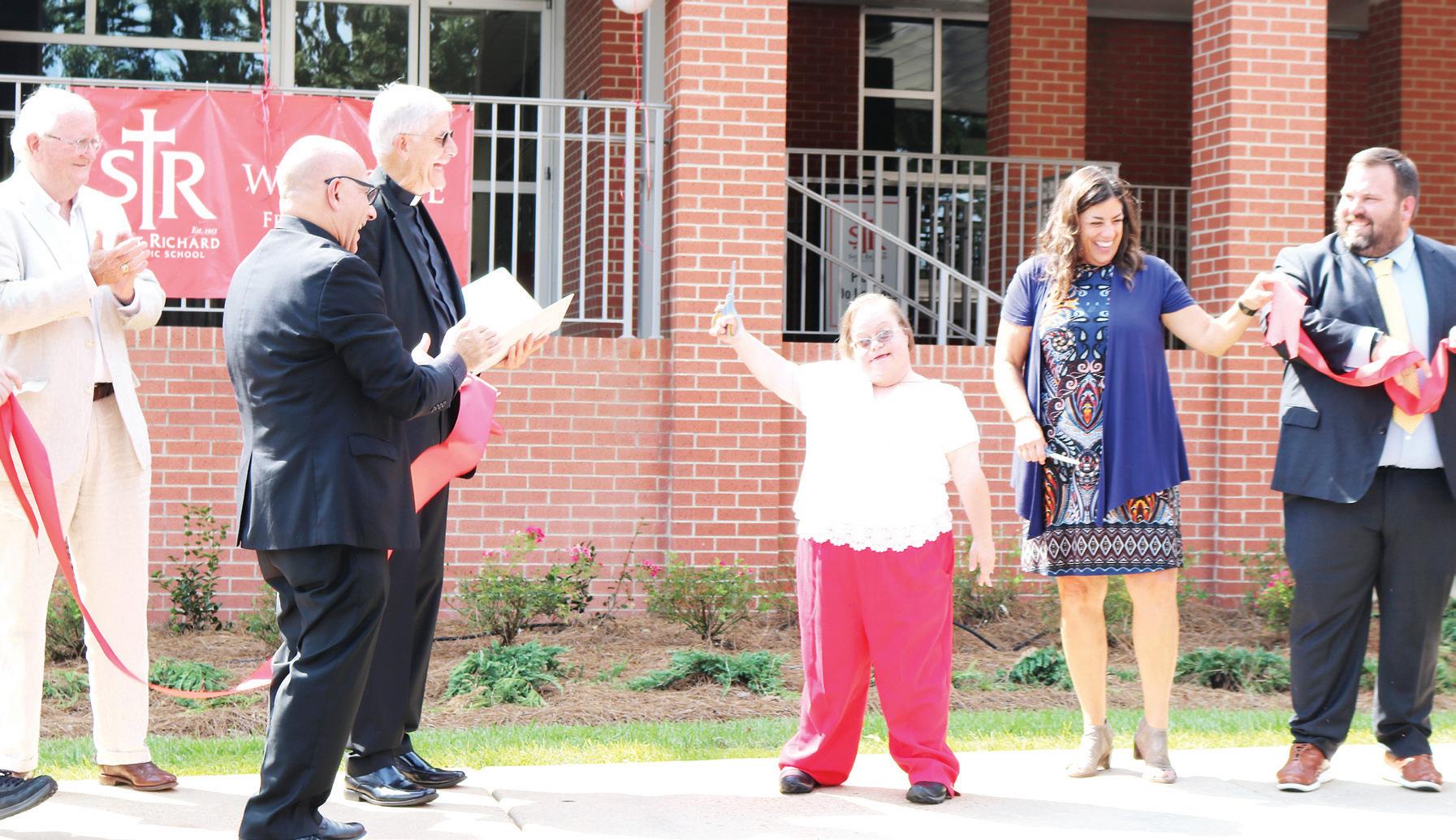
JACKSON – With a joyful cheer, Eve Walsh raises the scissors in triumph after cutting the ribbon for St. Richard School’s new Meadowbrook campus on Sunday, Aug. 10, 2025. Sharing in the moment are (from left) Gerald Beard, project manager; Father Joe Tonos, pastor of St. Richard Parish; Bishop Joseph Kopacz; Eve Walsh; Joni House, incoming executive director of Catholic Education for the Diocese of Jackson; and Russ Nelson, principal. (Photo by Joanna Puddister King)
BY CINDY WOODEN
VATICAN CITY (CNS) – Stories about “the first 100 days” are standard fare at the beginning of a U.S. president’s four-year term; the articles usually focus on how much the new president was able to accomplish and how quickly.
But a pope is elected for life and without having promised voters anything or having presented a platform.
Pope Leo XIV was
elected May 8, making Aug. 16 the 100th day since he stepped out onto the balcony of St. Peter’s Basilica as pope. He will celebrate his 70th birthday Sept. 14.
While the first 100 days of a pontificate may hint at what is to come, the initial period of Pope Leo’s ministry as the successor of Peter and bishop of Rome seemed mostly about him getting used to the role, the crowds and the protocol.
According to canon law, the pope “possesses supreme, full, immediate and universal ordinary power in the church, which he is always able to exercise freely.”
In other words, he could have issued a slew of the canonical equivalent of executive orders in his first



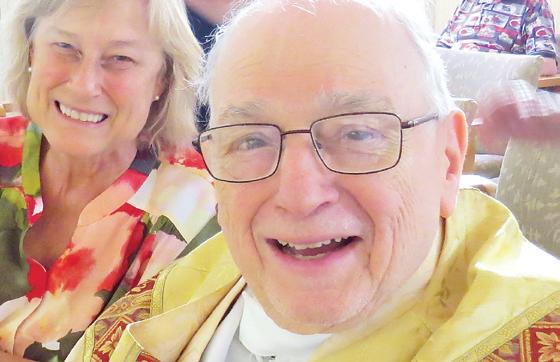

In memoriam 4 Father Sam Messina, 60 years a priest, dies at 86
days in o ce. Instead, he lived up to his reputation as a person who listens before deciding – holding a meeting with the College of Cardinals and individual meetings with the heads of Vatican o ces.
Like his predecessors, Pope Leo confirmed the heads of Curia o ces on a temporary basis a few days after his election. Some major nominations are expected in September or early October, starting with his own replacement as prefect of the Dicastery for Bishops.
His choices for members of his team, and whether he decides to have an international Council of Cardinals to advise him will send signals not only about what he wants to do but also how he wants to
– Continued on page 6 –


Back-to-School Section Highlights and photos from our Catholic schools

From the archives 10 Woodward explores memories from Hurricane Katrina – Continued on page 6 –

DIOCESE – Cathedral of St. Peter, Prayer Service in Solidarity with Dreamers and Migrants, Thursday, Sept. 18 at 7 p.m. Details: Sister Amelia Breton at amelia.breton@jacksondiocese.org.
GREENWOOD – Locus Benedictus, “Hearing The Voice of God” Retreat, Saturday, Sept. 13, 9 a.m. to 3 p.m. Presenter: Maria Vadia. No cost but love offering taken. Details: to register call (662) 299-1232 or email contactlocusbenedictus@gmail.com.
GLUCKSTADT – St. Joseph, Millions of Monicas – Praying with confidence for our children, each Tuesday from 6:30-7:30 p.m. in the church. Join with other mothers and grandmothers as we pray for our children’s faithful return to the church. Details: email millionsofmonicas@stjosephgluckstadt.com.
JACKSON – St. Richard, ChristLife: Discovering Christ, begins Wednesday, Sept. 10 and ends Oct. 22 from 6:30-8:30 p.m. in Foley Hall. Retreat on Saturday, Oct. 11. Enjoy a delicious meal, listen to a dynamic teaching that helps people enter into or renew a personal relationship with Jesus Christ, experience the love of God the Father and be empowered by the Holy Spirit to live as God’s children and join in a small group discussion. Register at https://bit. ly/3HvRKGE. Details: call Ti any at (601) 842-0151.
FLOWOOD – St. Paul Early Learning Center, Annual Golf Tournament, Friday, Sept. 19, tee o at 1 p.m. at Bay Pointe Golf Club. Registration opens at 11 a.m. Details: register at https://bit.ly/3Jn4XlS or email stpaullearningcenter@gmail.com.
The Diocese of Jackson has launched a third-party reporting system that will enable all diocesan employees, volunteers and parishioners to anonymously (or named if preferred) make reports. Examples of this activity include fraud, misconduct, safety violations, harassment or substance abuse occurring at a Catholic parish, Catholic school or at the diocesan level. The system is operated by Lighthouse Services.
To make a report visit www.lighthouse-services.com/jacksondiocese or call 888-830-0004 (English) or 800-216-1288 (Spanish).
GREENVILLE – St. Joseph, Parish Fair at St. Joseph School, Tuesday, Sept. 9. Details: church o ce (662) 335-5251.
HERNANDO – Holy Spirit, Fall Bazaar, Saturday, Sept. 13 from 9 a.m. to 3 p.m. Sales, silent auction, ra es and more. Details: email julieastefanik@ gmail.com.
MADISON – St. Francis, Parish Mission “Hope and Pilgrimage,” Oct. 26-27 from 5:30-7:45 p.m., with Catholic speaker and author Joan Watson. Details: church o ce at (601) 856-5556.
OLIVE BRANCH – Queen of Peace, Cocktails & Catholicism, Friday, Sept. 12 at 7 p.m. (doors open at 6 p.m.). Topic is Cursillo with speaker, Nikki Simmons. Ages 21+. BYOB. Details: church o ce (662) 895-5007.
Queen of Peace, Golf Tournament, Sunday Sept. 28 at 1 p.m. at the Wedgewood Golf Club. Cost: $125/player. Details: Tim at (901) 515-8598.
SOUTHAVEN – Christ the King, Fall Festival, Saturday, Oct. 18 from 10 a.m. to 5:30 p.m. Join us for food, games, music and more! Details: church o ce (662) 342-1073.
he is the brother of Grayson Foley. In the Sacraments section, a group photo from the Catholic Community of Meridian was misidentified as Confirmation candidates; the photo showed candidates and elect welcomed into the Church at the Easter Vigil. We apologize for the errors.
Catholic Diocese of Jackson – Jackson, MS
Join our mission-driven team! We’re seeking a practicing Catholic with a heart for service to support fundraising and stewardship e orts, including the Annual Catholic Service Appeal. is full-time role requires strong organizational and communication skills, experience in development or nonpro t work, and a commitment to the Church’s mission.

In the July 18 story “Diocesan seminarians witness history in Rome” by Madelyn Johnson, Sterling Foley was incorrectly identified as the brother of EJ Martin;
The Association of Priests of the Dioceses of Jackson and Biloxi provide a small pension to our retired priests. As you consider your estate plans, please remember these faithful servants by making a donation or leaving a bequest to the Association of Priests. Our parish priests dedicate their lives to caring for us, their flocks. Let us now care for them in their retirement. Donations can be made payable to the Association of Priests and can be mailed to:
Diocese of Jackson, P.O. Box 22723, Jackson, MS 39225-2723
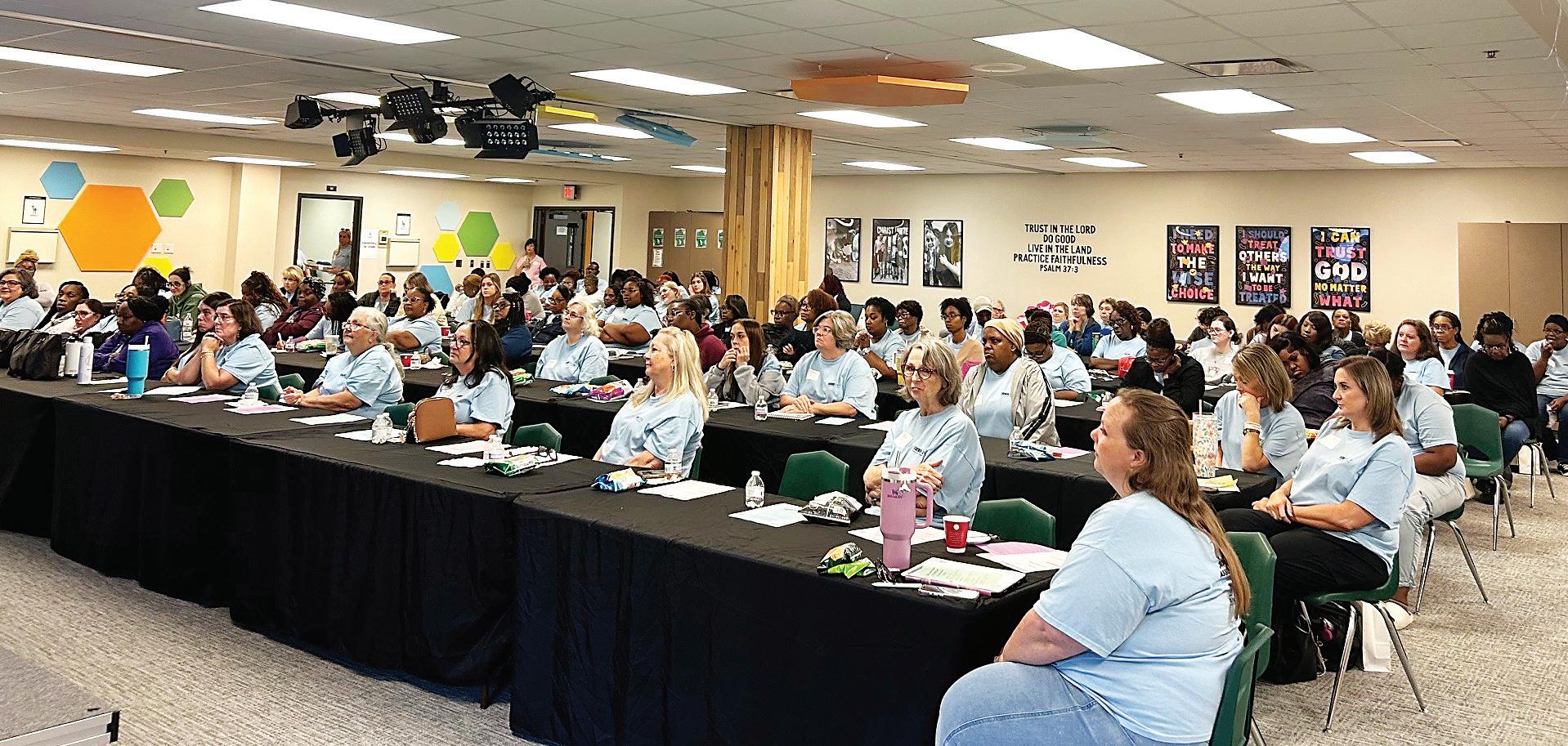
JACKSON – Educators from the Diocese of Jackson’s Early Learning Centers gathered July 28 at Christ United Methodist Church for their annual professional development. The Office of Catholic Education partnered with the Little Light House of Central Mississippi and the University of Mississippi Medical Center to provide training on Child Find, social-emotional therapy techniques and CARES behavior strategies. (Photo by Rachel Patterson)
Requirements:
• Bachelor’s degree (related eld)
• 3+ years in development/fundraising
• Strong writing, Excel & relationship skills
• Practicing Catholic in good standing
Apply by August 31.
Please send a cover letter and résumé to: Rebecca Harris, Diocese of Jackson PO Box 2248, Jackson, MS 39225

Questions?
have answers.
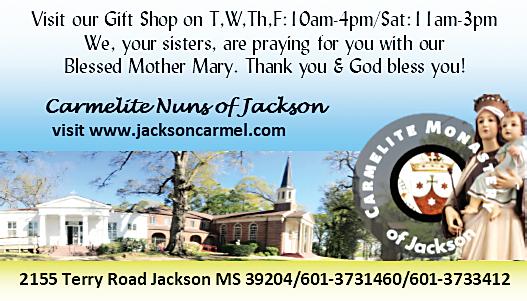
Flowood Pearl
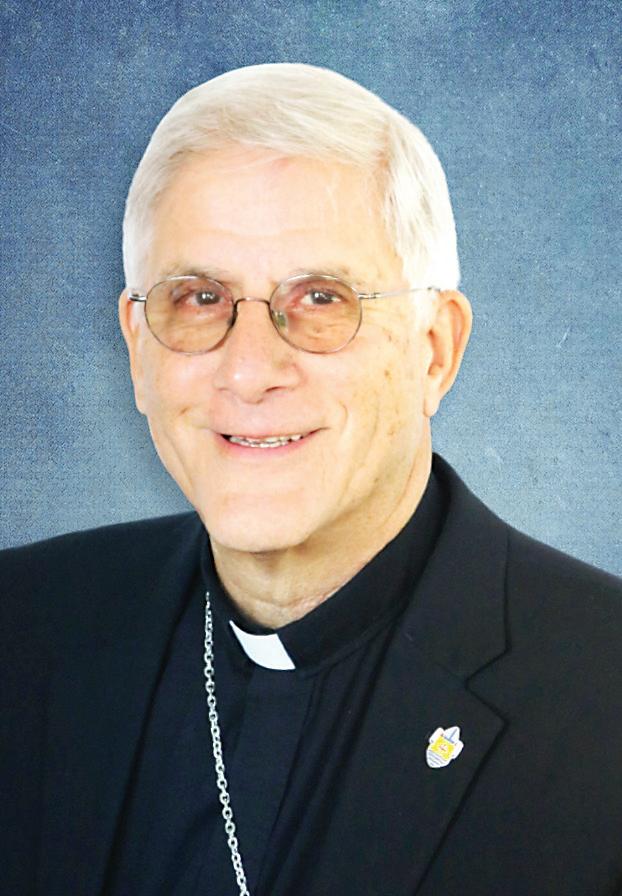
BY BISHOP JOSEPH R. KOPACZ, D.D.
The Jubilee of Hope has defined Pope Leo XIV’s first 100 days and will continue to be front and center in the early stages of his papacy until the Holy Door is closed on the Feast of the Epiphany in 2026. Eventually, the Holy Father will travel to the ends of the Earth, but for now pilgrims from every country where the Catholic Church has pitched its tent are flocking to Rome in Jubilee faith, hope and love. Throughout May, June and July, Pope Leo embraced them in the love of God. In an extraordinary way, the Jubilee Year has seamlessly witnessed the transition from the Ignatian Francis to the Augustinian Leo.
Recall that Pope Francis departed this world on Easter Monday, the day after the great day of hope, and his last public appearance was his Urbi et Orbi papal blessing on Easter Sunday. Since his installation one month later as the successor of Peter, Leo XIV has wrapped himself in the banner of hope, praying for peace and unity in the world and in the church in order to create a civilization of love.
The Holy Father’s preaching and teaching are directed to the hearts and minds of all people, but especially to those who have been baptized into the body of Christ and are on the path of discipleship. His words are both a message of consolation and encouragement, as well as a call to conversion and mission.
Among his many noteworthy addresses was his message to a packed stadium on the South Side of Chicago. On this occasion, Pope Leo was beamed in from Rome to the faithful gathered at Rate Field – home of the Chicago White Sox – for the celebration of the Eucharist – a Mass of Thanksgiving in the Archdiocese of Chicago for their native son’s emergence as the successor of Peter. Cardinal Cupich imaginatively dubbed his message the “Sermon on the Mound.” The occasion was one of a kind, but his message was universal.
After words of greeting, the Holy Father rejoiced to celebrate on the feast of the Most Holy Trinity, the source of all unity, love and peace. “I begin with that because the Trinity is a model of God’s love for us. God: Father, Son and Spirit. Three persons in one God live united in the depth of love, in community, sharing
August 5
Msgr. Elvin Sunds Retired
August 14
Father AnthonyClaret Onyeocha St. Joseph Woodville & Holy Family Gloster
August 16
Father Joe Dyer Retired
September 15
Father Bill Henry Retired
Thank you for answering the call!





P.O. Box 2130 Jackson, MS 39225-2130 Phone: 601-969-3581 E-mail: editor@jacksondiocese.org
13 (ISSN 1529-1693)

Publisher Bishop Joseph R. Kopacz
Communications Director Joanna Puddister King
Production Manager Tereza Ma
MISSISSIPPI CATHOLIC is an official publication of the Diocese of Jackson, 601-969-1880, 237 E. Amite St., Jackson, MS 39201. Published digitally twice per month January – April and September – December; once per month June, July and August. Mississippi Catholic mails 14 editions per year – twice per month in December and January; and once per month February – November. For address changes, corrections or to join the email list for the digital edition, email: editor@jacksondiocese.org. Subscription rate: $20 a year in Mississippi, $21 out-ofstate. Periodical postage at Jackson, MS 39201 and additional entry offices. POSTMASTER: Send address changes to Mississippi Catholic, P.O. Box 2130, Jackson, MS 39225-2130. Website: www.mississippicatholic.com www.jacksondiocese.org
that communion with all of us.”
During his address, the Holy Father spoke directly to the young people gathered in the stadium and to their peers participating online. It is a powerful message of hope, which I quote in large part: “I’d like to send a special word of greeting to all the young people – those of you gathered together today, and many of you who are perhaps watching this greeting through technological means, on the internet. As you grow up together, you may realize, especially having lived through the time of the pandemic – times of isolation, great di culty, sometimes even di culties in your families, or in our world today.
“Sometimes it may be that the context of your life has not given you the opportunity to live the faith, to live as participants in a faith community, and I’d like to take this opportunity to invite each one of you to look into your own hearts, to recognize that God is present and that, perhaps in many di erent ways, God is reaching out to you, calling you, inviting you to know his Son Jesus Christ, through the Scriptures, perhaps through a friend or a relative … a grandparent, who might be a person of faith. But to discover how important it is for each one of us to pay attention to the presence of God in our own hearts, to that longing for love in our lives, for … searching, a true searching, for finding the ways that we may be able to do something with our own lives to serve others.”
In his reflection, Pope Leo addressed every generation in the People of God to know their dignity as God’s children, to personally know the Lord Jesus as a friend, and to embrace the call to be ambassadors for hope in this world. “So, I would like to invite all of you to take a moment, to open up your own hearts to God, to God’s love, to that peace which only the Lord can give us. To feel how deeply beautiful, how strong, how meaningful the love of God is in our lives. And to recognize that while we do nothing to earn God’s love, God in his own generosity continues to pour out his love upon us. And as he gives us his love, he only asks us to be generous and to share what he has given us with others.”
In other words, play ball in the stadium of God’s kingdom.
Tuesday, August 26, 7:30 a.m. – Mass, Carmelite Monastery, Jackson
Tuesday, August 26, 12:05 p.m. – Anniversary Mass for Sister Amelia Breton’s 25th Anniversary, Cathedral of St. Peter the Apostle, Jackson
Thursday, August 28, 9:10 a.m. – School Mass, Vicksburg Catholic School
Friday, August 29, 8:30 a.m. – School Mass, Sister Thea Bowman School, Jackson
Friday, September 5, 6:30 p.m. – Mass of Remembrance, St. John, Oxford
Sunday, September 7, 8:15 a.m. – 80th Anniversary Celebration, Immaculate Conception, Clarksdale
Tuesday, September 9 & 16, 7:30 a.m. – Mass, Carmelite Monastery, Jackson
Thursday, September 11, 12 p.m. – Bishop’s Cup Golf Tournament, Lake Caroline Golf Club, Madison
Sunday, September 14, 10:30 a.m. – Confirmation, Holy Family, Jackson
Wednesday, September 17, 8:15 a.m. – School Mass, St. Anthony School, Madison
Thursday, September 18, 7 p.m. – Prayer Service for Migrants, Cathedral of St. Peter the Apostle, Jackson
Saturday, September 20, 10:30 a.m. – Mass of Remembrance, Cathedral of St. Peter the Apostle, Jackson
Sunday, September 24, 10 a.m. – Confirmation, St. Joseph, Woodville
All events are subject to change. Check with parishes, schools or organizations for further details.
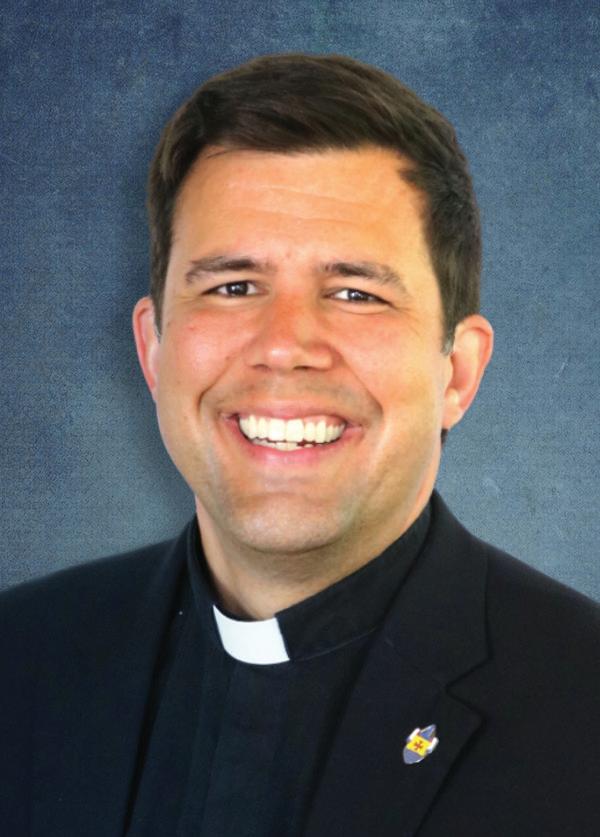
We had an atmosphere that was both different and familiar at our annual seminarian convocation in early August. Each summer, the seminarians gather to rest, relax and prepare for the new school year.
This year’s event was familiar because we enjoyed a fun time together, as always. Each morning, we prayed a holy hour, and either Father Tristan, Bishop Kopacz or I celebrated Mass before a day of recreation. The seminarians spent time fishing, swimming, playing pingpong and pool, and simply relaxing.
We also took care of some business, including taking photos for our annual poster and reviewing good communication practices and responsibilities for the coming year. Last year, you may have noticed that most of us sported mustaches on the poster – we called it the “mo-poster.” This year, the theme is “normal.” Ha!

What made this year truly different was the number of seminarians in attendance. We are proud and blessed to welcome six new seminarians this academic year – a 100% increase in enrollment. We now have 12 total seminarians. I give thanks to God for this great gift, and I know your prayers have been instrumental in making it possible.
The Lord tells us to beg the master of the harvest to send out laborers for his harvest. We’ve been doing that for years, and he is showing us how faithful he is. Praise the Lord!
Please keep this rapid growth in mind as you consider attending and supporting our Homegrown Harvest Festival in October. This annual fundraiser will take place Saturday, Oct. 11, at St. Francis Catholic Church in Madison. Our goal is to raise $200,000, which will
JACKSON – Rev. Samuel J. Messina, a priest of the Diocese of Jackson for 60 years, died Aug. 1, 2025, in Jackson, Miss., at age 86, just days before his 87th birthday.
He was born in 1938 in Grenada, Miss., to John V. and Mary T. Messina. He attended St. Joseph Seminary/College in Covington, La., and the Pontifical College Josephinum in Columbus, Ohio. He was ordained to the priesthood on May 29, 1965, and celebrated his first solemn Mass on June 6, 1965, at St. Peter Catholic Church in Grenada.
Father Messina served Catholic congregations across Mississippi as parochi al vicar, pastor, director of the diaconate, dean and chaplain. His assignments included Sacred Heart of Jesus, Hattiesburg; St. Michael, Vicksburg; St. Joseph, Greenville; St. Teresa of Avila, Chatawa; Immaculate Conception, West Point; Assumption of the Blessed Virgin Mary, Natchez; St. Joseph, Port Gibson;
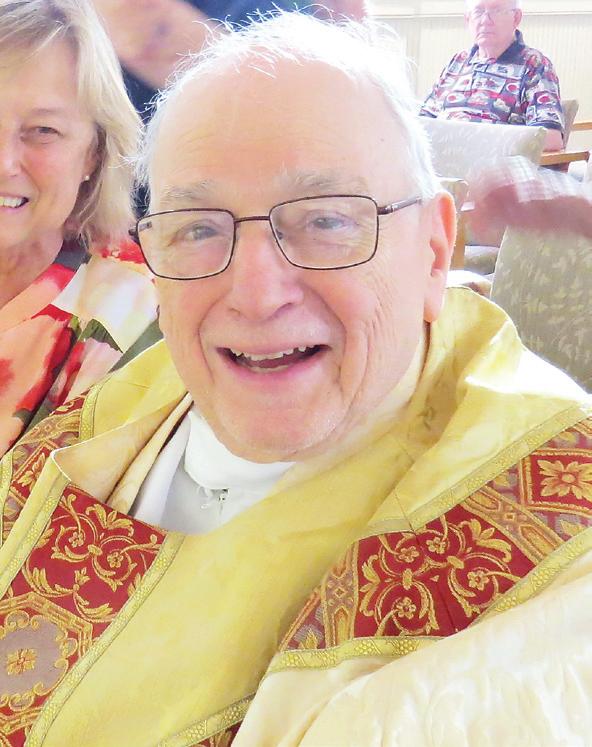
go directly toward funding the education of these future priests. We especially need sponsors.
If you haven’t received information in the mail or online, visit jacksondiocese.org/online-giving and click “Homegrown Harvest” to purchase tickets or become a sponsor.
We have been hard at work in this field for the last six years, and now we have six new seminarians in just one year. The Lord is with us in this mission. If you can help fund the education of our future priests, please consider doing so. I am so proud of our seminarians and grateful to God for this bountiful harvest. Thanks to so many of you who have been part of this ministry over the years – the best is yet to come!
(For more information on vocations, visit jacksonvocations.com or contact Father Nick at nick.adam@jacksondiocese.org.)
Mercy Hospital, McAuley Retirement Home and Mercy Sisters, Vicksburg; All Saints, Belzoni; Our Mother of Mercy Mission, Anguilla; St. Mary, Batesville; and St. John the Baptist Mission, Sardis. He was preceded in death by his parents; his brother, Joseph; and his sisters Katherine, Rose and Teresa. Survivors include his sister, Mary; and nieces and nephews Judith Anne, John Paul, Joseph, Doug, Brian, Rita, Diane, Michael, Maria, Connie, Ray and John, as well as several great-nieces and nephews.
A visitation, rosary and Mass of Christian Burial were held Aug. 17-18 at McKibben and Guinn Funeral Home and St. Peter Catholic Church in Grenada. Bishop Joseph Kopacz was the main celebrant.
Editor’s note: This obituary went to press before Father Messina’s funeral. Additional coverage of the services will appear in our next edition.
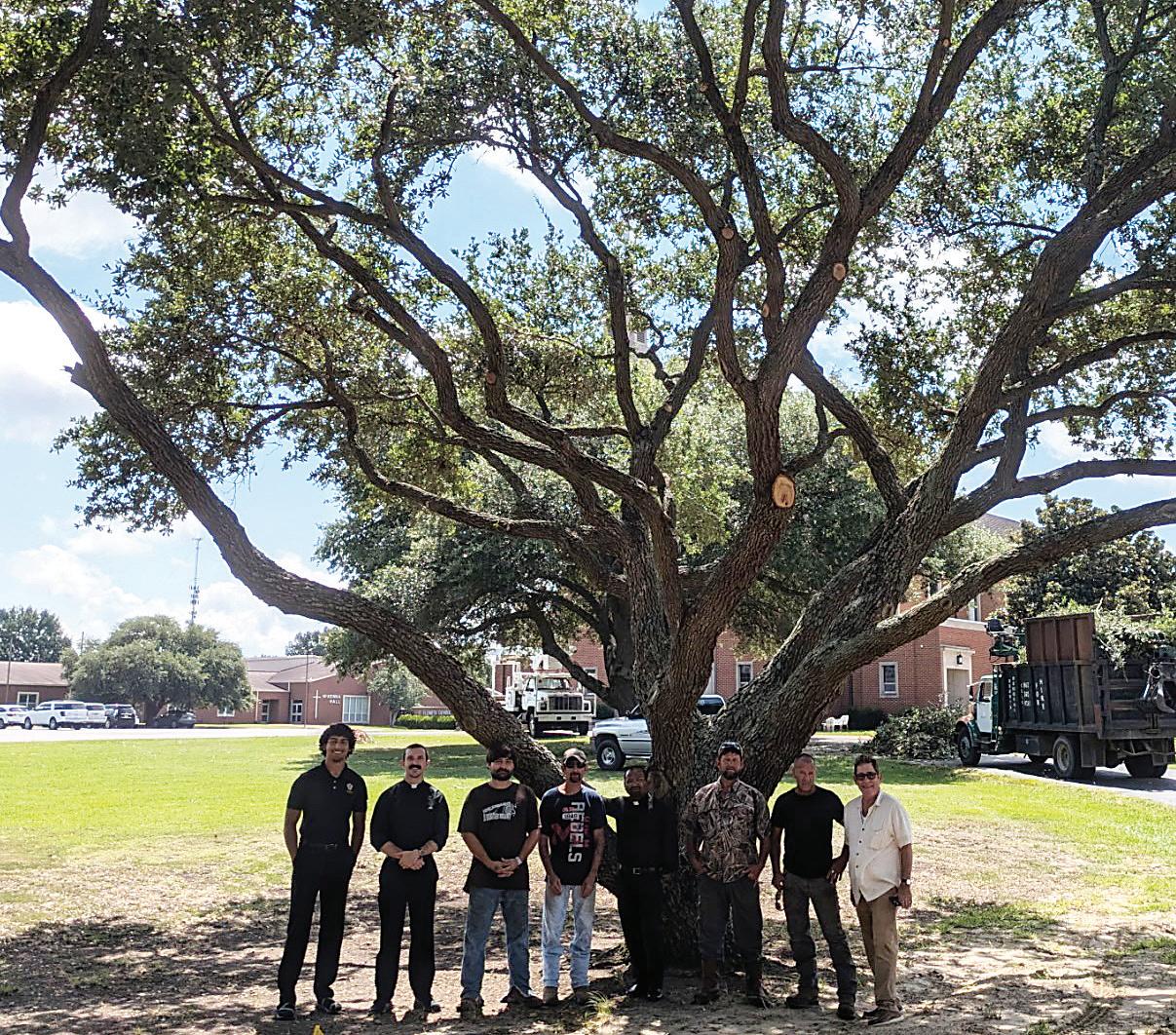
CLARKSDALE – Seminarians Francisco Maldonado and Will Foggo joined members of Russell Tree Service, Father Raju Macherla, and parish volunteer Ronnie Demilio in a campus beautification project at St. Elizabeth Church and School. The work included careful pruning of the parish’s 21 historic live oaks, a reminder of both the South’s natural beauty and the strength and rootedness of faith. (Photo by Catelin Britt)
By
Father ron rolheiser, oMi
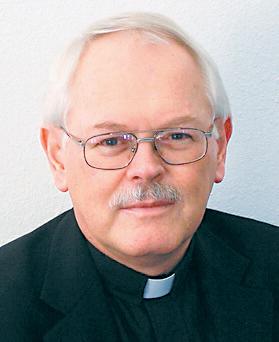
God’s presence inside us and in our world is rarely dramatic, overwhelming, sensational, impossible to ignore. God doesn’t work like that. Rather God’s presence is something that lies quiet and seemingly helpless inside us. It rarely makes a huge splash. We should know that from the very way God was born into our world. Jesus, as we know, was born into our world with no fanfare and no power, a baby lying helpless in the straw, another child among millions. Nothing spectacular to human eyes surrounded his birth. Then, during his ministry, he never performed miracles to prove his divinity, but only as acts of compassion or to reveal something about God. His ministry, like his birth, wasn’t an attempt to prove his divinity or prove God’s existence. It was intended rather to teach us what God is like and how God loves us unconditionally.
In essence, Jesus’ teaching about God’s presence in our lives makes clear that this presence is mostly quiet and under the surface, a plant growing silently as we sleep, yeast leavening dough in a manner hidden from our eyes, spring slowly turning a barren tree green, an insignificant mustard plant eventually surprising us with its growth, a man or woman forgiving an enemy. God works in ways that are seemingly hidden and can be ignored by our eyes. The God that Jesus incarnates is neither dramatic nor flashy.
And there’s an important lesson in this. Simply put, God lies inside us, deep inside, but in a way that is almost unfelt, often unnoticed, and can easily be ignored. However, while that presence is never overpowering, it has inside of it a gentle, unremitting imperative, a compulsion, which invites us to draw upon it. And if we do, it gushes up in us as an infinite stream that instructs, nurtures, and fills us with life and energy.
This is important for understanding how God is present inside us. God lies inside us as an invitation that always respects our freedom and never overpowers us, but also never goes away. It lies there precisely like a baby lying helpless in the straw, gently beckoning us, but helpless in itself to make us pick it up.
For example, C.S. Lewis shares this in explaining why, despite a strong affective and intellectual reluctance, he eventually became a Christian (“the most reluctant convert in the history of Christendom”). He became a believer, he says, because he was unable to ultimately ignore a quiet but persistent voice inside him which, because it was gentle and respectful of his freedom, he could ignore for a long time. But it never went away.
In retrospect, he realized it had always been there as an incessant nudge, beckoning him to draw from it, a gentle unyielding imperative, a “compulsion” which, if obeyed, leads to liberation.
Ruth Burrows, the British Carmelite and mystic, describes a similar experience. In her autobiography Before the Living God, she tells the story of her late adolescent years and how at that time in her life she thought little about religion and faith. Yet she eventually ends up not only being serious about religion but becoming a Carmelite nun and a gifted spiritual writer. What happened?
Triggered by a series of accidental circumstanc-
Got a message?
Reach 15,500+ Catholic homes with Mississippi Catholic!
Ad rates from $30; our popular size quarter page color ad is just $150. Visit mississippicatholic.com/advertise or email editor@jacksondiocese.org
es, one day she found herself in a chapel where, almost against her conscious will, she left herself open to a voice inside her which she had until then mainly ignored, precisely because it had never forced itself upon her freedom. But once touched, it gushed up as the deepest and most real thing inside her and set the direction of her life forever.
Like C.S. Lewis, she too, once she had opened herself to it, felt that voice as an unyielding moral compulsion opening her to ultimate liberation.
This is true too for me. When I was seventeen years old and graduating from high school, I had no natural desire whatsoever to become a Roman Catholic priest. But, despite a strong affective resistance, I felt a call to enter a religious order and become a Catholic priest. Despite that strong resistance inside me, I obeyed that call, that compulsion. Now, sixty years later, I look back on that decision as the clearest, most unselfish, faith-based, and life-giving decision I have ever made. I could have ignored that beckoning. I’m forever grateful I didn’t.
Fredrick Buechner suggests that God is present inside us as a subterranean presence of grace. The grace of God is “beneath the surface; it’s not right there like the brass band announcing itself, but it comes and it touches and it strikes in ways that leave us free to either not even notice it or to draw back from it.”
God never tries to overwhelm us. More than anyone else, God respects our freedom. God lies everywhere, inside us and around us, almost unfelt, largely unnoticed, and easily ignored, a quiet, gentle nudge; but, if drawn upon, the ultimate stream of love and life.
(Oblate Father Ron Rolheiser is a theologian, teacher and award-winning author. He can be contacted through his website www.ronrolheiser.com.)
The Pope’s Corner Works of mercy are best way to invest what God gave you, pope says
By Cindy Wooden
VATICAN CITY (CNS) – While giving money to charity is a good thing, God expects Christians to do more by giving of themselves to help others, Pope Leo XIV said.
“It is not simply a matter of sharing the material goods we have, but putting our skills, time, love, presence and compassion at the service of others,” the pope told thousands of people gathered in St. Peter’s Square Aug. 10 for the recitation of the Angelus prayer.
Commenting on the day’s Gospel reading, Luke 12:32-48, the pope focused on how Jesus invites his followers to “invest” the treasure that is their lives.
“Everything in God’s plan that makes each of us a priceless and unrepeatable good, a living and breathing asset, must be cultivated and invested in order to grow,” he said. “Otherwise, these gifts dry up and diminish in value, or they end up being taken away by those who, like thieves, snatch them up as something simply to be consumed.”
“The works of mercy are the most secure and profitable bank” for investing those treasures and talents, the pope said, “because there, as the Gospel teaches us, with ‘two small copper coins’ even the poor widow becomes the richest person in the world.”
Pope Leo urged people to be attentive so that no matter whether they are at home or work or in their parish they do not “miss any opportunity to act with love.”
“This is the type of vigilance that Jesus asks of us: to grow in the
habit of being attentive, ready and sensitive to one another, just as he is with us in every moment,” the pope said.
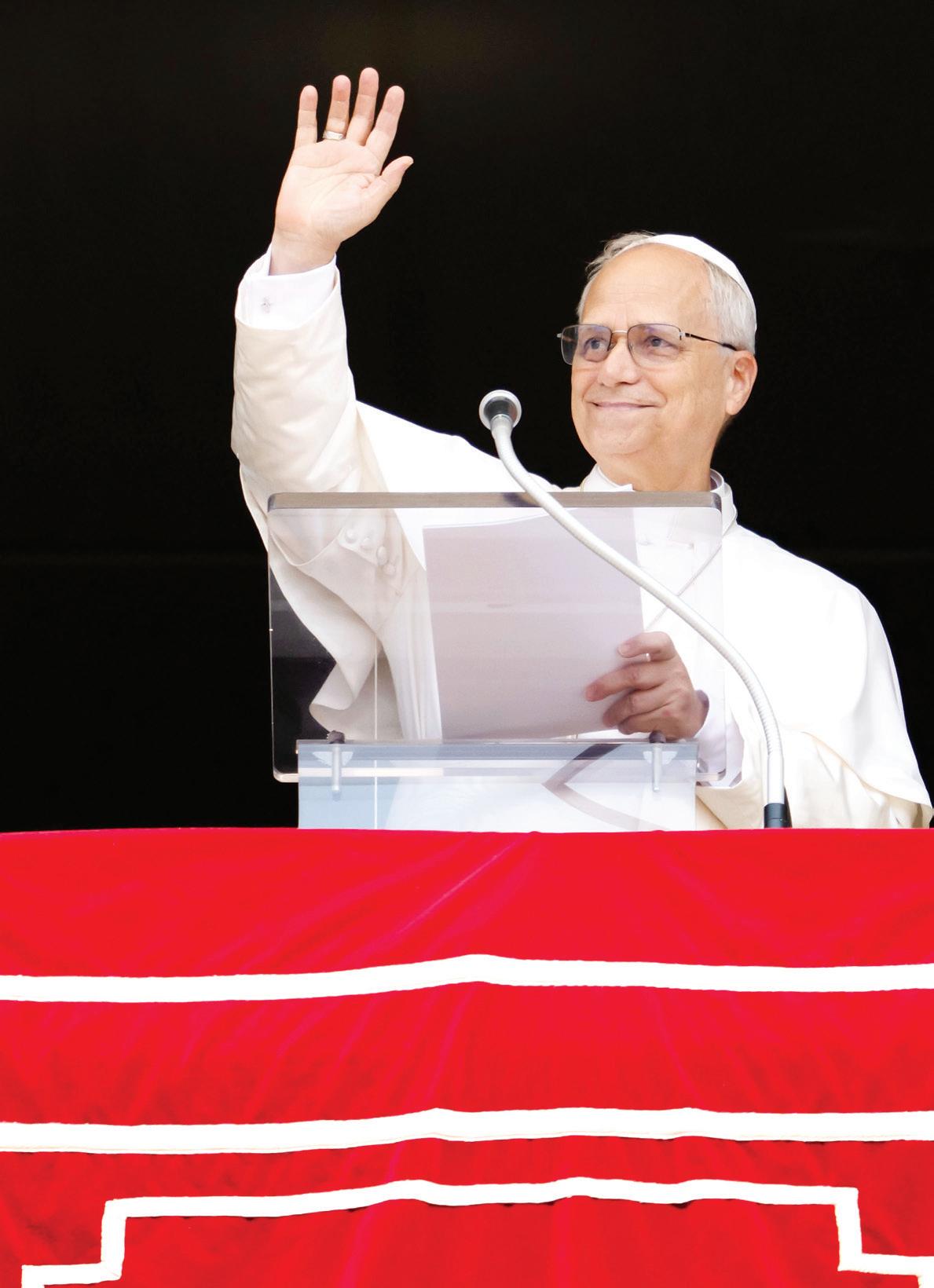
‘ ... Our visibility alone will open doors ...’
– Continued from page 1 –
Catholic school facility.
Principal Russ Nelson said having a location that puts the school “front and center” in the community is a game changer. “In the past, there were many people in the Jackson area who didn’t even know St. Richard School existed,” he said. “Now, our visibility alone will open doors, spark conversations and help us connect with more families than ever before.”
Nelson, who guided the project from concept to completion, said the process was more than construction – it was a mission-driven transformation. He credited much of the project’s success to Gerald Beard, the volunteer project manager whose dedication, expertise and countless hours of service helped bring the vision to life.
A parishioner at St. Richard, Beard brought decades of construction and public service experience to the role, including his tenure as the City of Jackson’s director of public works in the 1990s. Since 2012, he has volunteered at St. Dominic Hospital and previously oversaw the St. Richard Early Learning Center project. “With every detail and every decision, Gerald gave his very best – and we are profoundly grateful,” said Nelson.
With the assistance of Beard and the generosity of parishioners, alumni and friends of the school, Nelson noted that the new campus is “designed to inspire learning, foster community and reflect the joy we have in Catholic education.”
The new campus also honors individuals who have made lasting contributions to St. Richard. The main academic building now bears the name of Eve Walsh, a proud graduate of St. Richard and a beloved member of St. Richard parish’s Special Kids program. Born with Down syndrome in 1972, “Miss Eve” has been a lifelong member of the parish and a joyful witness to the school’s inclusive spirit. After graduating from the Special Kids program, she
– Continued from page 1 –
do it. (Pope Francis set up the Council of Cardinals early in his pontificate to help him with the reform of the Roman Curia and to advise him on other matters, but he did not make the council a formal body.)
September also should bring an announcement about where Pope Leo will live. Several cardinals have said that in the days before the conclave they encouraged the future pope –whoever he would be – to move back into the papal apartment in the Apostolic Palace.
In his first public address, moments after his election, the new pope said: “We want to be a synodal church, a church that moves forward, a church that always seeks peace, that always seeks charity, that always seeks to be close above all to those who are su ering.”
Pope Leo went deeper when he spoke about the key objectives of his ministry – in a pontificate that easily could last 20 years – during a meeting with the College of Cardinals two days after his election.
began working in the school cafeteria in September 1999 and retired in 2024.
Known for her ever-present smile, warm greetings and tireless work ethic, Eve helped prepare and serve meals, visited with children and pitched in wherever needed. “Eve has been the heart of our school for decades,” said Father Joe Tonos, pastor of St. Richard. “Naming the building in her honor tells every student that they, too, are loved and valued here.”
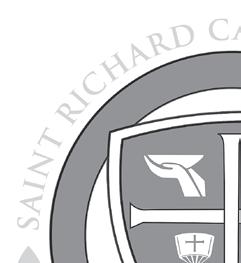
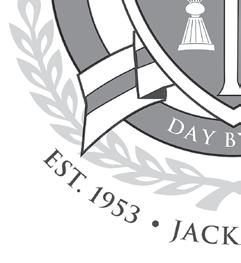
Among the most distinctive additions to the new campus is the Wiggle Room – a calm, supportive space designed for students who need a moment to refocus or regroup. Created with intention and care, the Wiggle Room reflects St. Richard’s commitment to nurturing the whole child – mind, body and spirit. The space is filled with sensory elements and calming areas where students can feel safe, supported and able to reset before returning to class ready to learn.
“It’s a blessing for both students and teachers,” said development director Celeste Saucier. “It’s more than just a room – it’s a message to our students that we believe in their ability to succeed, and we are committed to helping them feel calm, comforted and confident every step of the way.” This focus on well-being is part of the school’s broader commitment to meet students where they are, strengthen its exceptional education program and ensure that every child – no matter how they learn – can thrive.
Among the most meaningful additions to the renovated campus is the Father Brian Kaskie Memorial Chapel, a quiet space where students, faculty and visitors can pause for prayer and reflection. A large, smiling photo of Father Brian greets all who enter, capturing the joyful, approachable spirit he was so well known for. Father Brian, who died in 2021 at age
AUGUST 22, 2025
57, was beloved for his larger-than-life personality, quick wit and deep compassion. He had a special gift for connecting with young people, often making them feel seen, understood and valued.
Father Joe Tonos, a close friend, recalled how much Father Brian loved being among students and sharing the faith in a way that made it real and personal. “I think he would be thrilled to see a space where students can encounter Christ daily, right here in the heart of their school,” Tonos said.
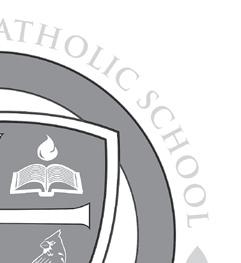

The St. Richard School campus move and renovations also address safety, accessibility and long-term sustainability. Upgraded entrances, enhanced lighting and energy-e cient systems ensure the campus meets both present needs and future growth.
While much has been accomplished, the A Future Filled with Hope campaign continues, and there are still opportunities to be part of this chapter in St. Richard’s story. Naming opportunities remain for classrooms, stained-glass windows, the playground and the refectory, which houses classrooms, the gym and the cafeteria. “Every gift helps us reach our goal and leaves a lasting mark on our school’s story,” Saucier said.
The project represents years of planning and collaboration between the parish, school leadership and the community. Nelson said he hopes the campus will serve students for decades to come. “This is about preparing our children academically, spiritually and socially for the world they will enter – and reminding them they are never alone on that journey,” he said.
To learn more about supporting the campaign, A Future Filled with Hope, or exploring naming opportunities, contact Celeste at csaucier@strichardschool.org, call (601) 366-1157 or visit www.strichardschool.org.
‘... We want to be a synodal church ...’
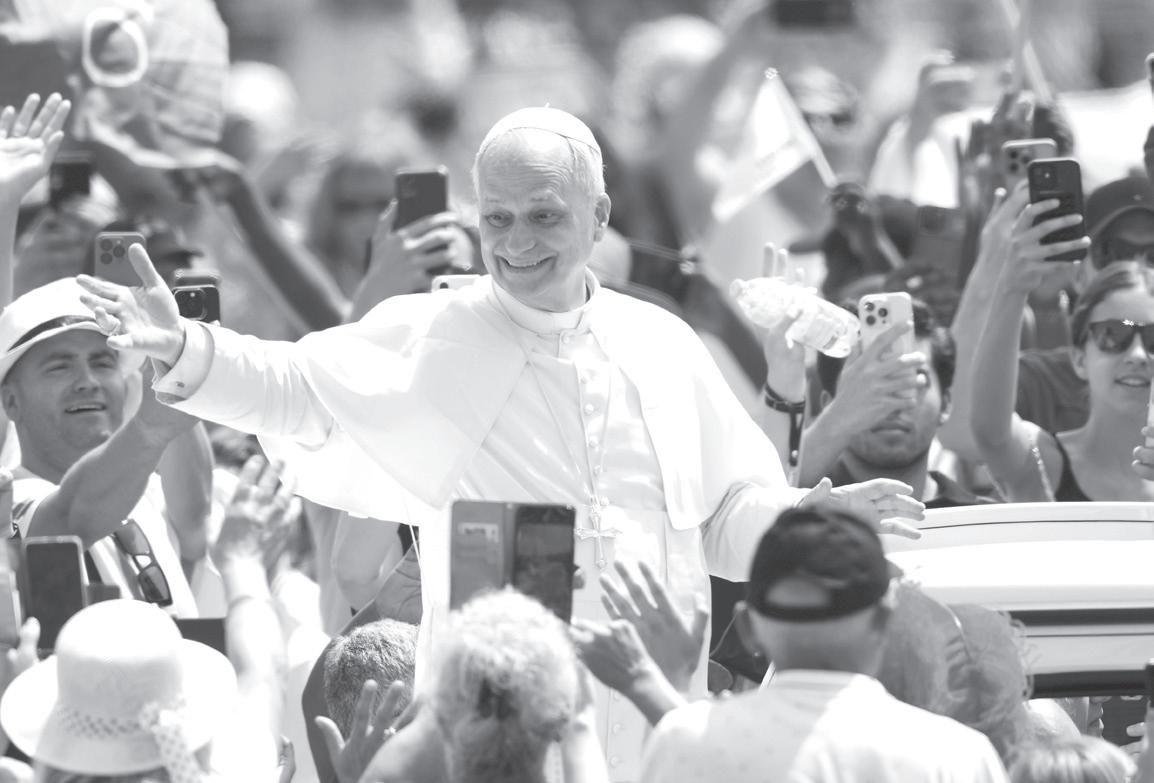
Pope Leo XIV greets people as he rides in the popemobile in St. Peter’s Square after celebrating Mass for the conclusion of the Jubilee of Sport in St. Peter’s Basilica at the Vatican June 15, 2025. (CNS photo/Lola Gomez)
He asked the cardinals to join him in renewing a “complete commitment to the path that the universal church has now followed for decades in the wake of the Second Vatican Council.”
That path had six fundamental points that, Pope Leo said, “Pope Francis masterfully and concretely set it forth” in his exhortation, “The Joy of the Gospel.”
The six points highlighted by Pope Leo were: “the return to the primacy of Christ in proclamation; the missionary conversion of the entire Christian community; growth in collegiality and synodality; attention to the ‘sensus fidei’ (the people of God’s sense of the faith), especially in its most authentic and inclusive

forms, such as popular piety; loving care for the least and the rejected; (and) courageous and trusting dialogue with the contemporary world in its various components and realities.”
Those realities include the widespread media attention focused on the election of the first U.S.-born pope as well as the fact that people feel free to use social media to proclaim what Pope Leo “should” do, “must” or “must not” do.
According to a Gallup Poll published Aug. 5, Pope Leo was the most favorably viewed of 14 world leaders and newsmakers; 57% of Americans said they had a “favorable opinion” of him and 11% said they had an “unfavorable” opinion.
“These figures closely match Pope Francis’ ratings when he assumed the role in 2013, then viewed favorably by 58% and unfavorably by 10%, as well as Pope Benedict in 2005 – 55% favorable, 12% unfavorable,” Gallup said.
As the weeks passed after his election, Pope Leo seemed to grow more comfortable with a crowd, spending more time blessing babies and enjoying his interactions with the thousands of people who came to St. Peter’s Square for his weekly general audiences.
At his general audience Aug. 6 – held outside on a very warm summer day –the pope finished his formal program in less than an hour, then spent another two and a half hours shaking hands, posing for photos with pilgrim groups and having unusually long conversations with dozens of newlywed couples before o ering them his blessing.
As a Curia o cial, the future pope had a reputation of being reserved, but Pope Leo has shown he has a special tool for connecting with a crowd: speaking English and Spanish as well as Italian, the Vatican’s o cial working language.
By Kate Scanlon
WASHINGTON (OSV News) – Some immigrant religious workers are facing legal limbo, and Catholic advocates are pushing the Trump administration to address the backlog in their visa category.
Many immigrant religious workers, such as Catholic priests and nuns, legally enter the country on R-1 non-immigrant religious worker visas. These are initially granted for a 30-month period, with one possible renewal allowing for a total of five years. During that window, they can apply for employment-based EB-4 status to remain in the U.S. without interruption.
“One of the challenges is that because the number of green cards that are issued every year is not representative of the number of people that are eligible,” said Erin Corcoran, associate teaching professor and executive director of the University of Notre Dame’s Kroc Institute for International Peace Studies.
That backlog could have a grave impact on the church in the U.S. The National Study of Catholic Priests, released in 2022 by The Catholic University of America’s Catholic Project, indicated 24% of priests serving in the U.S. are foreign-born.
In April, bipartisan legislation, the Religious Workforce Protection Act, was introduced in the Senate by Sens. Tim Kaine, D-Va.; Susan Collins, R-Maine; and Jim Risch, R-Idaho, and in the House by Reps. Mike Carey, R-Ohio, and Richard Neal, D-Mass. All five are Catholic.
If signed into law, the bill would permit religious workers already in the U.S. on temporary R-1 status with pending EB-4 applications to stay in the U.S. while waiting for permanent residency, Collins’ office said.
Catholic organizations, including the U.S. Conference of Catholic Bishops (USCCB), Jesuit Refugee Service/USA and the Catholic Legal Immigration Network (CLINIC), have backed the legislation.
A USCCB spokesperson told OSV News on Aug. 6, “We’re continuing our education efforts about the pressing need for the RWPA.”
“We remain hopeful that Congress will have an opportunity to move the bill forward before the end of the year,” the spokesperson said.
Corcoran said the legislation would allow, for example, a Catholic priest with temporary R-1 status to move from one parish to another in accordance with diocesan needs.
The bill would not increase the limit on how many visas are granted.
“It’s a very modest fix,” she said.
Despite bipartisan support, it was not immediately clear what the prospects might be for the bill once lawmakers return from their August recess, or whether President Donald Trump would sign it.
The White House did not respond to a request for comment from OSV News by publication time on whether the Trump administration would support the bill.
Dylan Corbett, executive director of the Hope Border Institute, told OSV News, “Congress and the Trump administration have a good opportunity to make an urgent targeted fix to ensure clergy and religious from abroad serving our communities throughout the country don’t become casualties of an increasingly broken immigration system.”
Corcoran said, “We’ve seen so little bipartisan solutions to problems, and we all benefit from these people being in our parishes.”
Advocacy for the bill comes as the Trump administration seeks to implement hardline immigration policies, including its pursuit of what it has called “the largest deportation in U.S. history.”
However, Secretary of State Marco Rubio said in an Aug. 7 interview with Raymond Arroyo on EWTN’s The World Over that the administration is trying to “create its own standalone process” for religious workers, instead of having them conflated with other immigration categories.
“And I’ve been in touch, for example, with a number of our cardinals here in the United States and bishops about that as well,” Rubio said. “We don’t want to read headlines that some Catholic Church had to close because it couldn’t get their priests here … some order closed because some nun couldn’t get here.”
Congress is scheduled to return from its August recess in early September.
By Kate Scanlon
WASHINGTON (OSV News) – U.S. Citizenship and Immigration Services reportedly closed off a pathway for citizenship for immigrants who apply for green cards through a spouse or other family members, raising the prospect of deporting them and breaking up their families.
NBC News reported that new guidance issued by the U.S. Citizenship and Immigration Services made a change to its policy manual stating that federal immigration authorities may begin removal proceedings for those seeking legal status through a spouse or other relative.
“Petitioners and alien beneficiaries should be aware that a family-based petition accords no immigration status nor does it bar removal,” the guidance said.
In an Aug. 1 memo about the policy change, USCIS said, “Fraudulent, frivolous, or otherwise non-meritorious family-based immigrant visa petitions erode confidence in family-based pathways to lawful permanent resident (LPR) status and undermine the immigration system in the United States.”
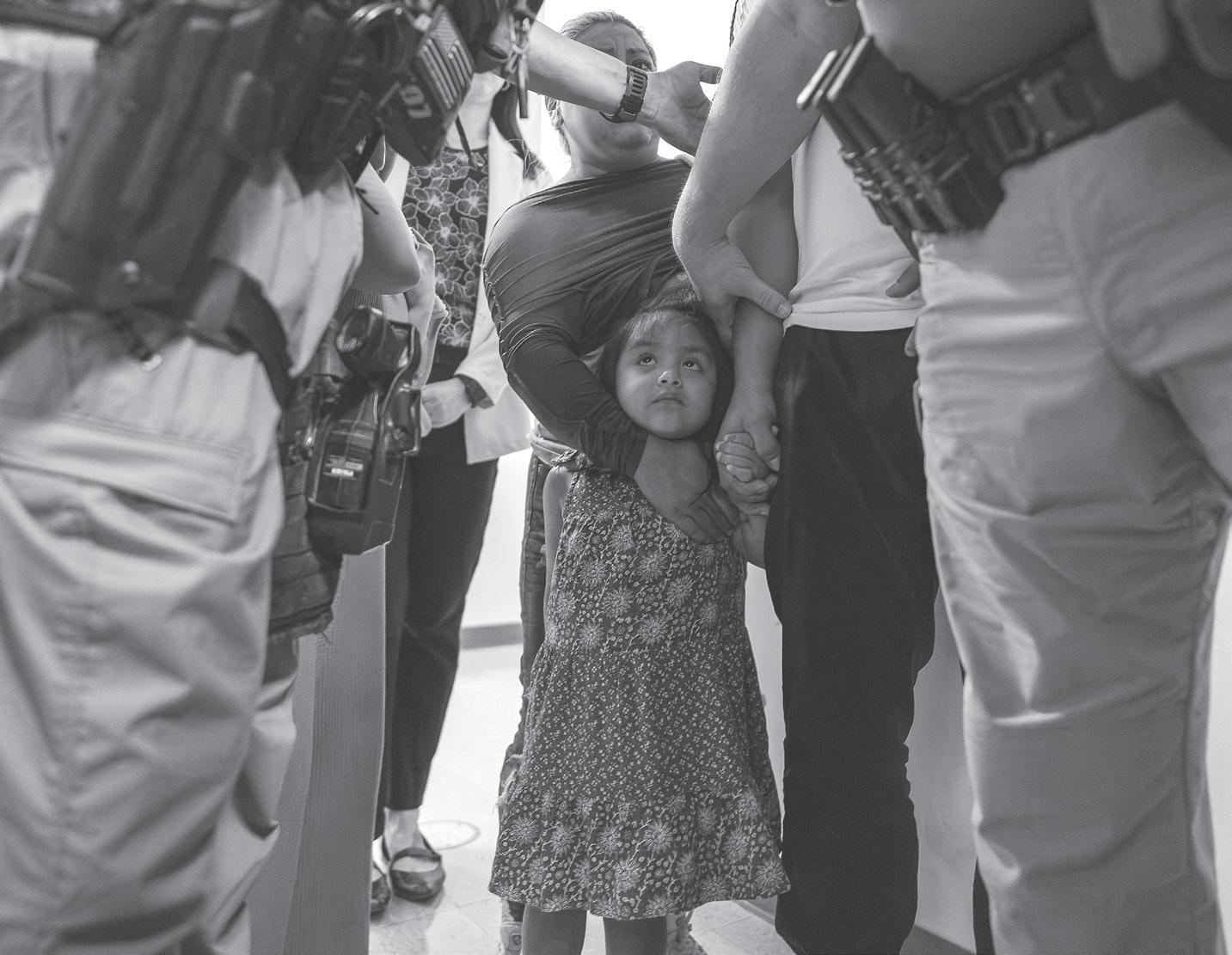
A child looks up at federal immigration officers as her father is detained at the U.S. immigration court in the Manhattan borough of New York City July 25, 2025. (OSV News photo/David ‘Dee’ Delgado, Reuters)
“USCIS must ensure that qualifying marriages and family relationships are genuine, verifiable, and compliant with all applicable laws,” the memo said.
Dylan Corbett, executive director of the Hope Border Institute, a group that
works to apply the perspective of Catholic social teaching in policy and practice to the U.S.-Mexico border region, told OSV News, “The administration continues to insist that they are simply targeting criminals in immigration enforcement operations, but that’s not what is happening.”
“They are deploying ICE agents to arrest people showing up to their immigration hearings,” Corbett said. “They are taking away people’s legal status and making them undocumented by revoking their parole and TPS. And now they are threatening to go after those trying to pursue lawful residency.”
On social media, USCIS argued it was “consolidating and clarifying certain requirements for family-based immigration” to “increase the integrity and security of our immigration processes.”
But Corbett argued, “Rather than trying to rack up numbers with an indiscriminate mass deportation campaign, we should be focusing on offering legal pathways to migrants who are desperate to do things the right way.”
“That’s something everybody can agree on,” he said.
(Kate Scanlon is a national reporter for OSV News covering Washington. Follow her on X @kgscanlon.)
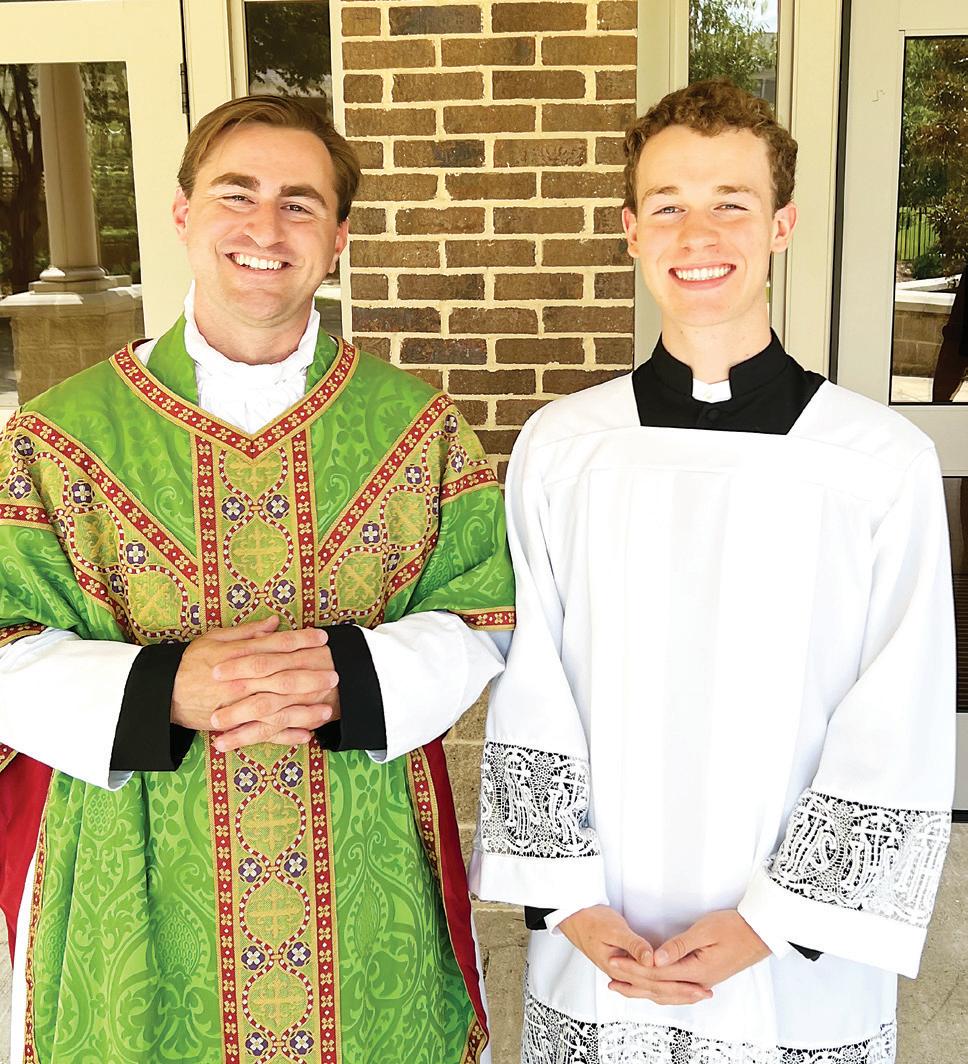









Since 1972, the DIOCESE OF JACKSON has been partnering with Catholic Extension to build the faith in central Mississippi. Join us and together we can build and repair churches, strengthen and grow essential ministries and support our lay and ordained leaders. OR MAIL YOUR DONATION TO:



















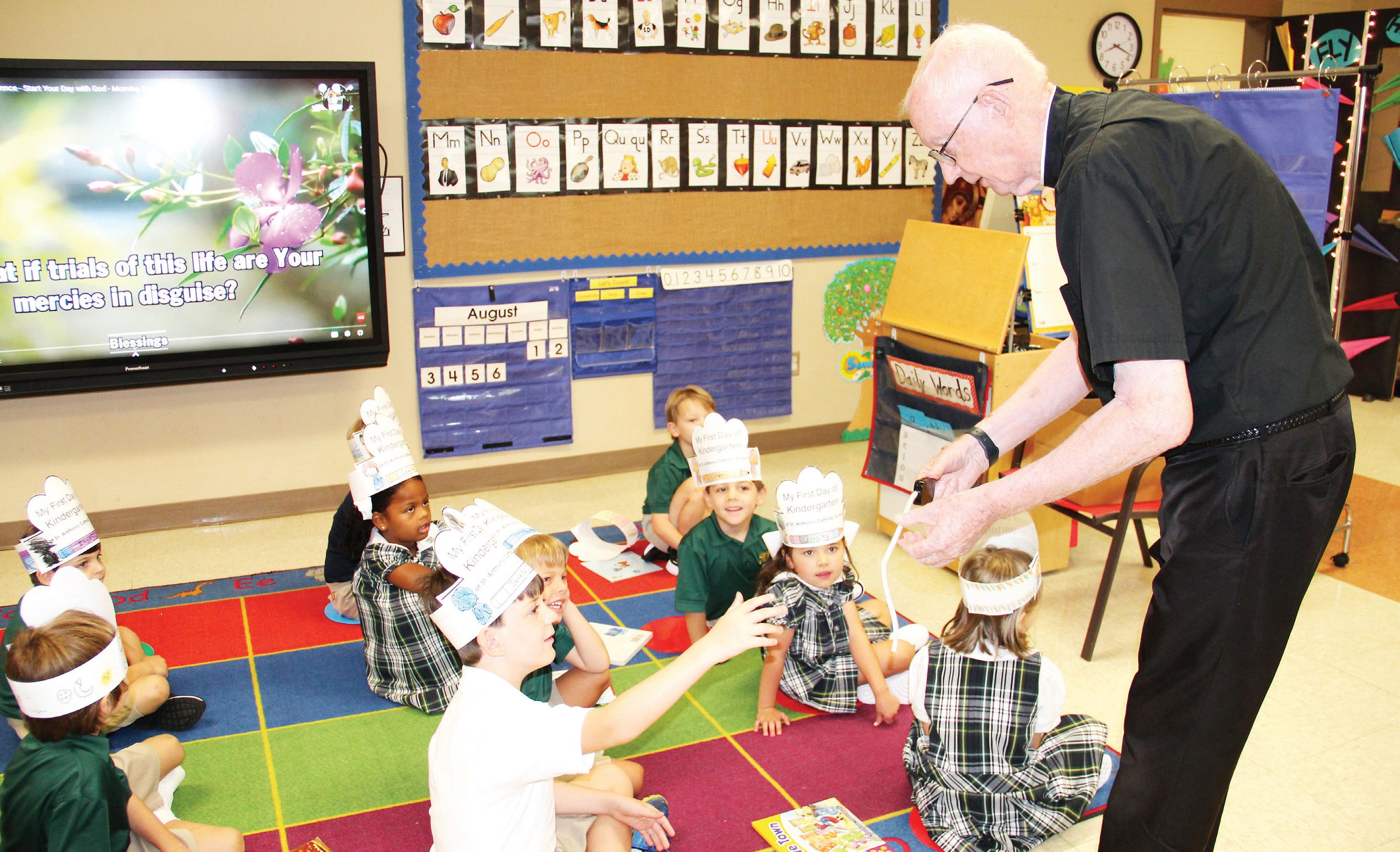




































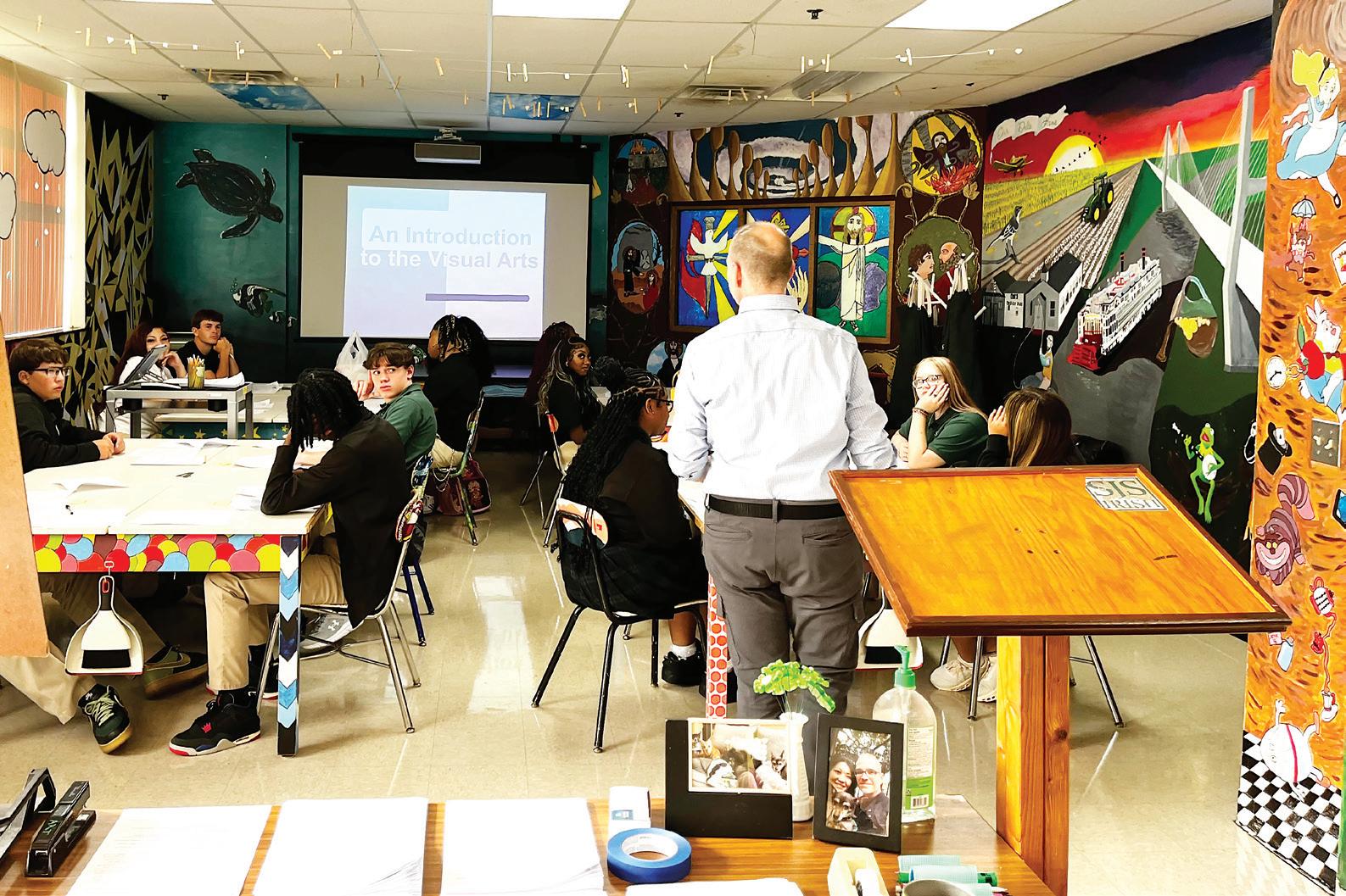
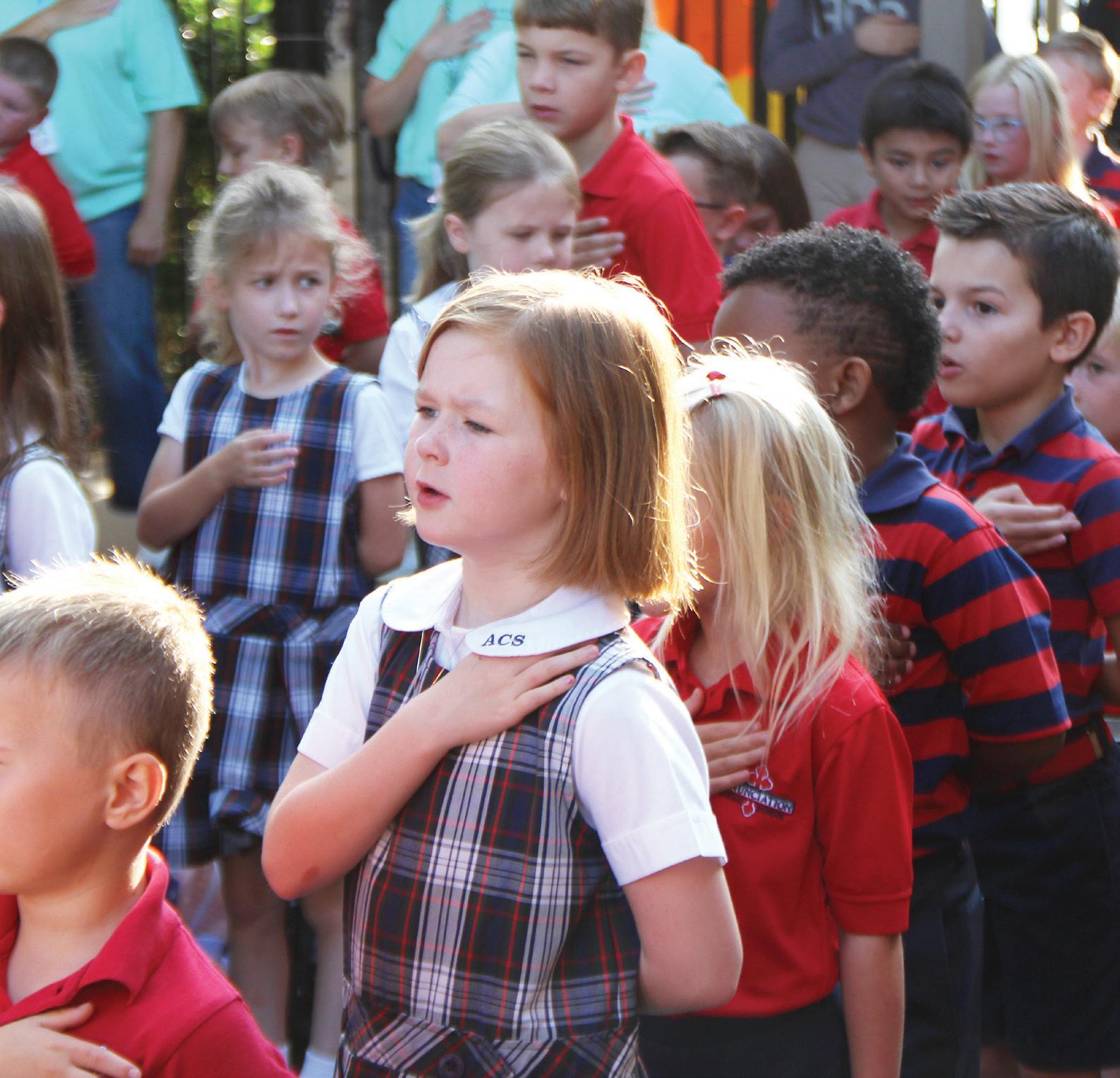
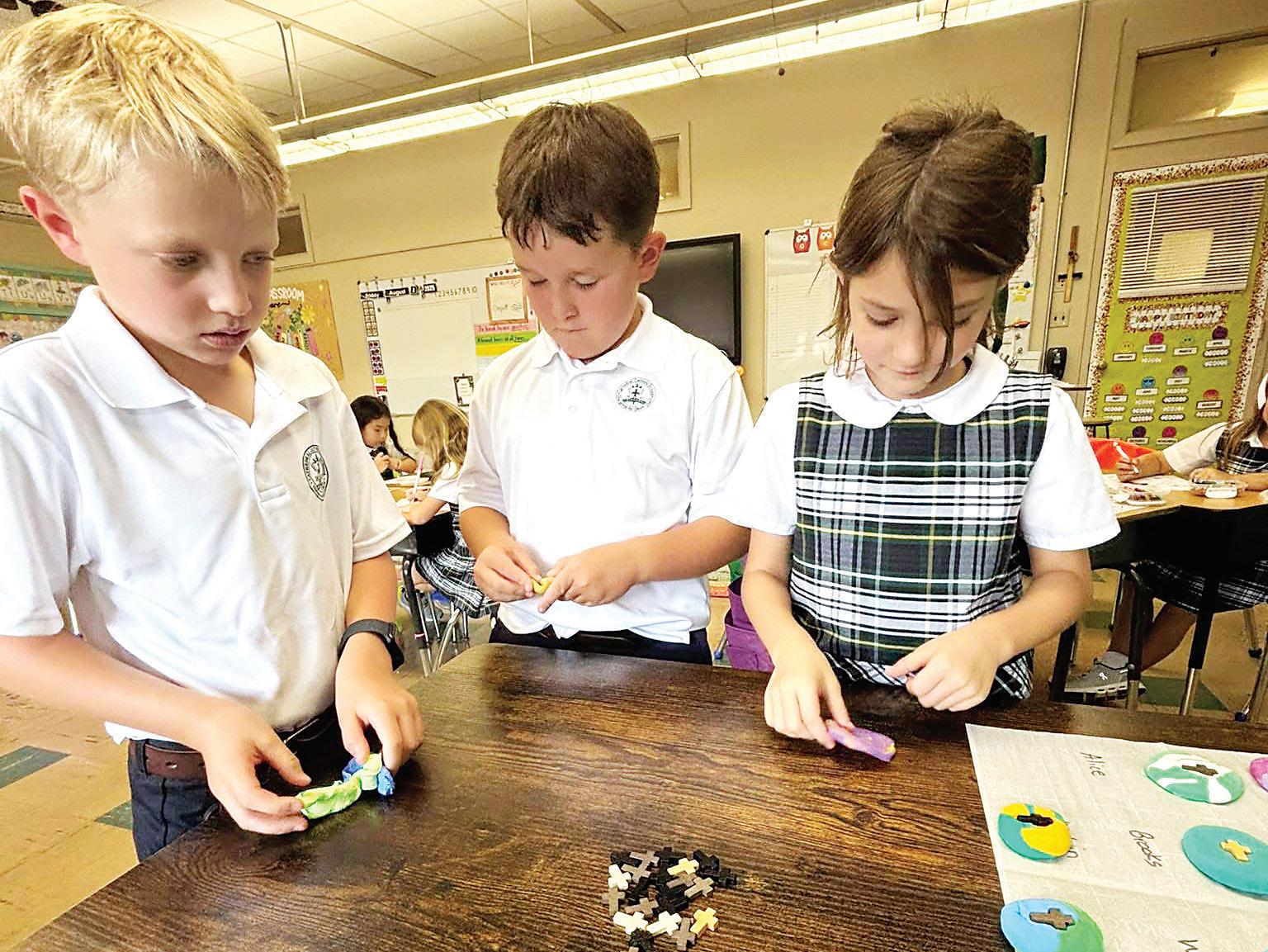




Por cinDy WooDen
CIUDAD DEL VATICANO (CNS) – Los artículos sobre "los primeros 100 días" son habituales al comienzo del mandato de cuatro años de un presidente de Estados Unidos; estos artículos suelen centrarse en lo mucho que el nuevo presidente ha sido capaz de lograr y en lo rápido que lo ha hecho.
Pero un pontífice es elegido de por vida y sin haber prometido nada a los votantes ni haber presentado un programa electoral.
El Papa León XIV fue elegido el 8 de mayo, por lo que el 16 de agosto marcan los 100 días desde que salió al balcón de la basílica de San Pedro como nuevo Papa. El 14 de septiembre celebrará su 70.º cumpleaños.
Si bien los primeros 100 días de un pontificado pueden dar una idea de lo que está por venir, el período inicial del ministerio del Papa León como sucesor de Pedro y obispo de Roma pareció centrarse principalmente en su adaptación al cargo, a las multitudes y al protocolo.
Según el derecho canónico, el Papa "tiene, en virtud de su función, potestad ordinaria, que es suprema, plena, inmediata y universal en la Iglesia, y que puede siempre ejercer libremente".
En otras palabras, podría haber emitido una serie de órdenes ejecutivas canónicas en sus primeros días en el cargo. En cambio, hizo honor a su reputación de persona que escucha antes de decidir, celebrando una reunión con el Colegio Cardenalicio y reuniones individuales con los jefes de las oficinas del Vaticano.
– Continúa en la página 2 –
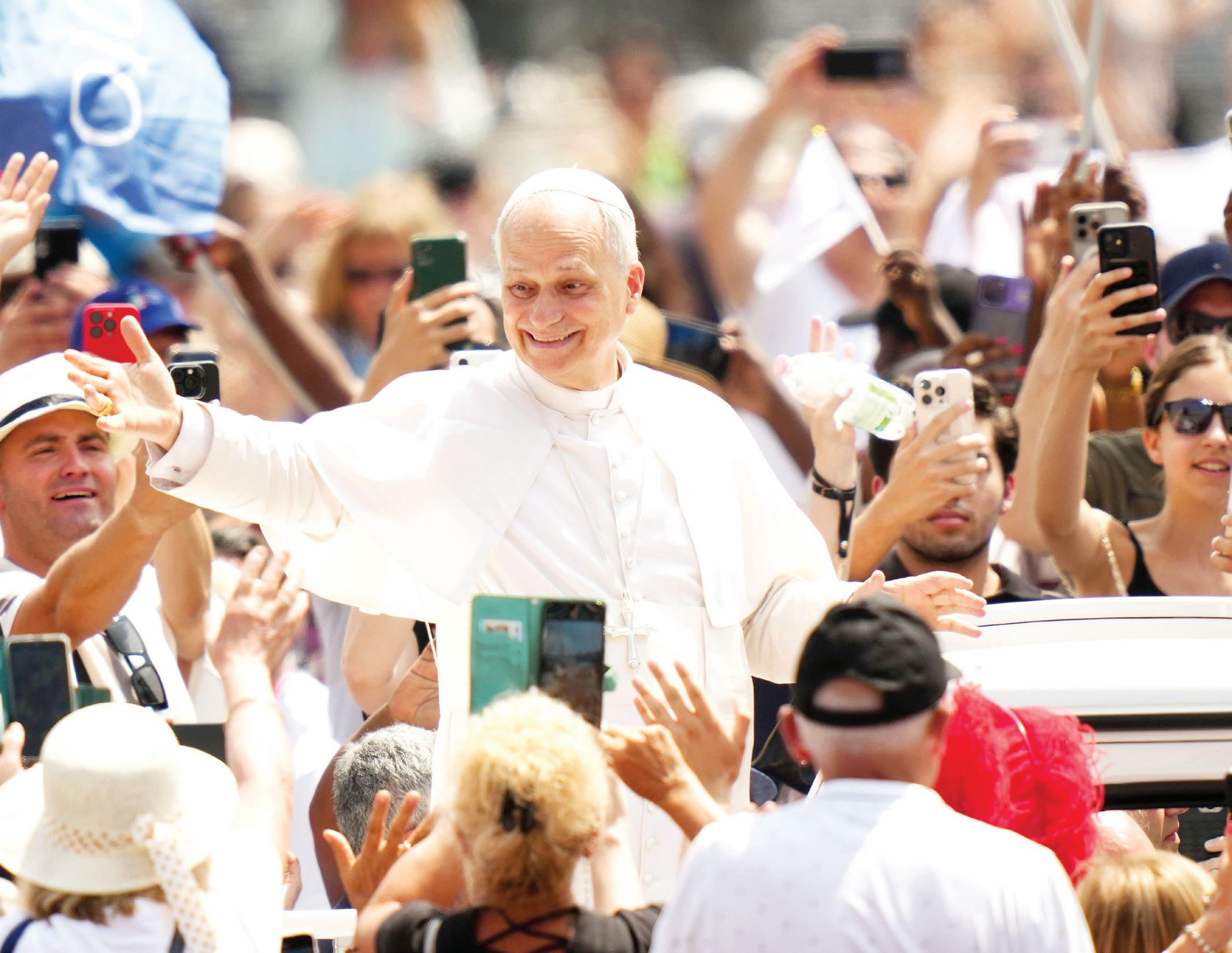
El papa León XIV saluda a la gente mientras recorre la plaza de San Pedro en el papamóvil tras celebrar la misa de clausura del Jubileo del Deporte en la basílica de San Pedro, en el Vaticano, el 15 de junio de 2025. (Foto CNS/Lola Gómez)
El cambio en la política de 'green cards' puede dejar a los inmigrantes que buscan la regularización vulnerables a la deportación
Por KaTe scanLon
WASHINGTON (OSV News) – El Servicio de Ciudadanía e Inmigración de EE.UU. habría cerrado una vía para la ciudadanía a los inmigrantes que solicitan la residencia permanente ("tarjeta verde" o "green card") a través de un cónyuge u otros familiares, lo que aumenta la posibilidad de deportarlos y separar a sus familias.
NBC News informó de que las nuevas directrices publicadas por el Servicio de Ciudadanía e Inmigración de EE.UU. (USCIS por sus siglas en inglés) introdujeron un cambio en su manual de políticas que establece que las autoridades federales de inmigración pueden iniciar procedimientos de expulsión para aquellos que buscan un estatus legal a través de un cónyuge u otro familiar.
"Los solicitantes y los extranjeros beneficiarios deben ser conscientes de que una petición basada en la familia no otorga estatus migratorio ni impide la expulsión", dice la guía.
En un memorando del 1 de agosto sobre el cambio de política, USCIS dijo: "Las peticiones de visa de inmigrantes basadas en la familia fraudulentas, frívolas o no meritorias erosionan la confianza en las vías basadas en la familia para
obtener el estatus de residente legal permanente y socavan el sistema de inmigración en los Estados Unidos".
"USCIS debe garantizar que los matrimonios y las relaciones familiares que reúnan los requisitos sean genuinos, verificables y conformes con todas las leyes aplicables", dice el memorando.
Dylan Corbett, director ejecutivo de Hope Border Institute, un grupo que trabaja para aplicar la perspectiva de la doctrina social católica en la política y la práctica en la región fronteriza entre Estados Unidos y México, dijo a OSV News: "La administración sigue insistiendo en que simplemente están atacando a los criminales en las operaciones de aplicación de la ley de inmigración, pero eso no es lo que está sucediendo".
"Están desplegando agentes de ICE para arrestar a las personas que se presentan a sus audiencias de inmigración", dijo Corbett. "Están quitando el estatus legal a la gente y convirtiéndolos en indocumentados al revocarles el 'parole' humanitario y el TPS. Y ahora amenazan con ir tras los que intentan conseguir la residencia legal".
– Continúa en la página 2 –
'... Queremos ser una iglesia sinodal ...'

El papa León XIV, anteriormente cardenal Robert F. Prevost, saluda a la multitud en la plaza de San Pedro desde la logia central de la basílica de San Pedro en el Vaticano tras su elección como papa el 8 de mayo de 2025. El nuevo papa nació en Chicago. (Foto CNS/Lola Gómez)
– Viene de la página 1 –
Al igual que sus predecesores, el Papa León confirmó a los jefes de las oficinas de la Curia de forma temporal pocos días después de su elección. Se esperan algunos nombramientos importantes en septiembre o principios de octubre, empezando por su propio sustituto como prefecto del Dicasterio para los Obispos.
Sus elecciones para los miembros de su equipo, y si decide crear un Consejo Internacional de Cardenales para que le asesore, enviarán señales no solo sobre lo que quiere hacer, sino también sobre cómo quiere hacerlo. (El Papa Francisco creó el Consejo de Cardenales al principio de su pontificado para que le ayudara con la reforma de la Curia Romana y le asesorara en otros asuntos, pero no convirtió el consejo en un órgano formal).
En septiembre también se debería anunciar dónde vivirá el Papa León. Varios cardenales han dicho que, en los días previos al cónclave, animaron al futuro pontífice, fuera quien fuera, a volver a mudarse al apartamento papal del Palacio Apostólico. La mudanza facilitaría la seguridad, ahorraría dinero al Vaticano y permitiría que la Domus Sanctae Marthae, donde el Papa Francisco decidió vivir, volviera a funcionar plenamente como casa de huéspedes.
En su primer discurso público, momentos después de su elección, el nuevo Papa dijo: "Queremos ser una Iglesia sinodal, una Iglesia que camina, una Iglesia que busca siempre la paz, que busca siempre la caridad, que busca siempre estar cerca especialmente de aquellos que sufren".
El Papa León profundizó en los objetivos clave de su ministerio – en un pontificado que fácilmente podría durar 20 años – durante una reunión con el Colegio Cardenalicio dos días después de su elección.
Pidió a los cardenales que se unieran a él para renovar juntos "nuestra plena adhesión a ese camino, a la vía que desde hace ya decenios la Iglesia universal está recorriendo tras las huellas del Concilio Vaticano II".
Ese camino tenía seis puntos fundamentales que, según el Papa León, "el Papa Francisco ha recordado y actualizado magistralmente" en su primera exhortación, "La Alegría del Evangelio".
Los seis puntos destacados por el Papa Leo fueron: "el regreso al primado de Cristo en el anuncio; la conversión misionera de toda la comunidad cristiana; el crecimiento en la colegialidad y en sinodalidad; la atención al sensus fidei (el sentido de la fe del pueblo de Dios), especialmente en sus formas más propias e inclusivas, como la piedad popular; el cuidado amoroso de los débiles y descartados; el diálogo valiente y confiado con el mundo contemporáneo en sus diferentes componentes y realidades".
Entre esas realidades se encuentra la amplia atención mediática centrada en la elección del primer pontífice nacido en Estados Unidos, así como el hecho de que personas de todo tipo se sienten libres de utilizar las redes sociales para proclamar lo que el Papa Leo "debería" hacer, "debe" o "no debe" hacer.
Según una encuesta de Gallup realizada en Estados Unidos entre el 7 y el 21 de julio y publicada el 5 de agosto, el papa León era el más apreciado de entre 14 líderes mundiales y personalidades destacadas; el 57 % de los estadounidenses dijo tener una "opinión favorable" de él y el 11 % dijo tener una opinión "desfavorable".
"Estas cifras coinciden en gran medida con las valoraciones del Papa Francisco cuando asumió el cargo en 2013, entonces visto favorablemente por el 58% y desfavorablemente por el 10%, así como con las del Papa Benedicto en 2005: 55% favorable, 12% desfavorable", afirmó Gallup.
Entre los encuestados, los que se identificaban como católicos otorgaron a los tres pontífices valoraciones aún más altas al comienzo de sus pontificados, según el grupo encuestador, "con un 76% de opiniones favorables hacia León, un 80% hacia Francisco y un 67% hacia Benedicto".
A medida que pasaban las semanas tras su elección, el Papa León parecía sentirse más cómodo con la multitud, dedicando más tiempo a bendecir a los bebés y disfrutando de su interacción con la multitud de personas que acudían a la plaza de San Pedro para sus audiencias generales semanales.
En su audiencia general del 6 de agosto, celebrada al aire libre en un día muy caluroso de verano, el Papa terminó su programa formal en menos de una hora y luego pasó otras dos
horas y media estrechando manos, posando para fotos con grupos de peregrinos y manteniendo conversaciones inusualmente largas con docenas de parejas de recién casados antes de ofrecerles su bendición. Como funcionario de la Curia, el futuro Papa tenía fama de ser algo reservado, pero el Papa León ha demostrado que tiene una herramienta especial para conectarse con la multitud: habla inglés y español, además de italiano, el idioma oficial de trabajo del Vaticano.
Su capacidad para cambiar entre los tres idiomas sin esfuerzo quedó plenamente demostrada en el Jubileo de los Jóvenes, celebrado del 28 de julio al 3 de agosto, y el Jubileo de los Misioneros Digitales y los Influencers Católicos, celebrado del 28 al 29 de julio. Los jóvenes aplaudieron con entusiasmo cuando les habló en idiomas que la mayoría podía entender.
Aunque sus raíces estadounidenses y su experiencia misionera en Perú sin duda influirán en su papado, ha sido muy respetuoso con la tradición italiana de no hacer anuncios ni cambios importantes durante las vacaciones de verano.
' ... Deberíamos centrarnos en ofrecer vías ... a los inmigrantes ... desesperados por hacer las cosas de la manera correcta ...'
– Viene de la página 1 –
En las redes sociales, USCIS argumentó que estaba "consolidando y aclarando ciertos requisitos para la inmigración basada en la familia" para "aumentar la integridad y seguridad de nuestros procesos de inmigración."
Pero Corbett argumentó: "En lugar de tratar de acumular números con una campaña de deportación masiva indiscriminada, deberíamos centrarnos en ofrecer vías legales a los inmigrantes que están desesperados por hacer las cosas de la manera correcta."
"Eso es algo en lo que todo el mundo puede estar de acuerdo", dijo.
(Kate Scanlon es una reportera nacional de OSV News que cubre Washington. Síguela en X @kgscanlon.)

Un inmigrante es detenido por agentes federales de inmigración en un tribunal de inmigración de EE.UU. en el distrito de Manhattan de la ciudad de Nueva York el 25 de julio de 2025. (Foto de OSV News/David 'Dee' Delgado, Reuters)
Por obisPo JosePh r. KoPacz, D.D.
El Jubileo de la Esperanza ha definido los primeros 100 días del Papa León XIV y seguirá siendo el centro de atención en las primeras etapas de su papado hasta que se cierre la Puerta Santa en la Fiesta de la Epifanía en 2026. Eventualmente, el Santo Padre viajará a los confines de la Tierra, pero por ahora los peregrinos de todos los países donde la Iglesia Católica ha armado sus carpas están acudiendo en abundancia a Roma en la fe, la esperanza y el amor del Jubileo. A lo largo de los meses de mayo, junio y julio, el Papa León los abrazó con el amor de Dios. De una manera extraordinaria, el Año Jubilar ha sido testigo sin problemas de la transición del Francisco ignaciano al León agustino.
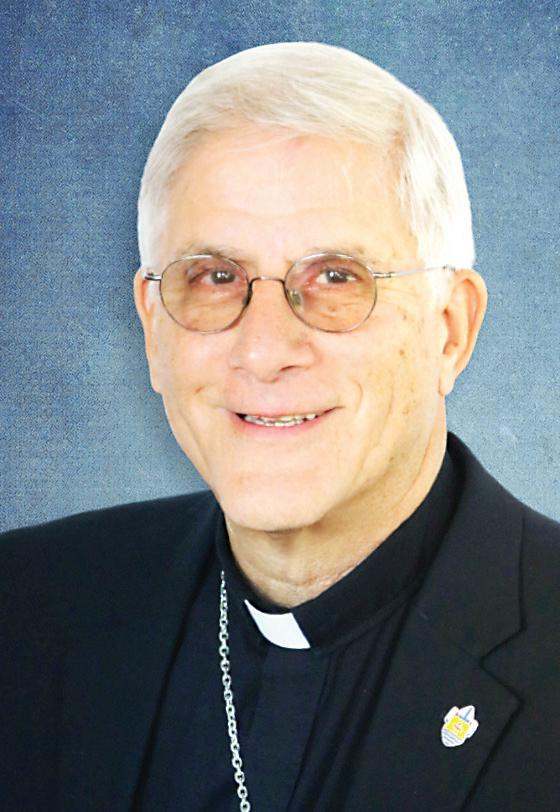
Recordemos que el Papa Francisco partió de este mundo el lunes de Pascua el día después del gran día de la esperanza, y su última aparición pública fue su bendición papal Urbi et Orbi el Domingo de Pascua. Desde su instalación un mes después como sucesor de Pedro, León XIV se ha envuelto en la bandera de la esperanza, rezando por la paz y la unidad en el mundo y en la Iglesia para crear una civilización del amor.
La predicación y la enseñanza del Santo Padre están dirigidas a los corazones y las mentes de todas las personas, pero especialmente a aquellos que han sido bautizados en el cuerpo de Cristo y están en el camino del discipulado. Sus palabras son tanto un mensaje de consuelo y aliento, como un llamado a la conversión y la misión.
Entre sus muchos discursos notables estuvo su mensaje a un estadio repleto en el lado sur de Chicago. En esta ocasión, el Papa León fue transmitido desde Roma a los fieles reunidos en White Sox Rate Field para la celebración de la Eucaristía, una Misa de Acción de Gracias en la Arquidiócesis de Chicago por el surgimiento de su hijo nativo como sucesor de Pedro. El cardenal Cupich imaginativamente llamó a su mensaje “el Sermón del monte". La ocasión fue única, pero su mensaje fue universal.
Después de las palabras de saludo, el Santo Padre se alegró de celebrar la fiesta de la Santísima Trinidad, fuente de toda unidad, amor y paz. "Empiezo con eso porque la Trinidad es un modelo del amor de Dios por nosotros. Dios: Padre, Hijo y Espíritu. Tres personas en un solo Dios viven unidas en la profundidad del amor, en comunidad, compartiendo esa comunión con todos nosotros".
Durante su discurso, el Santo Padre se dirigió directamente a los jóvenes reunidos en el estadio y a sus compañeros que participan en línea. Es un poderoso mensaje de esperanza, que señalo en gran parte: "Me gustaría enviar unas palabras de saludo en especial a todos los jóvenes, a los que estáis reunidos hoy, y a muchos de vosotros que quizás estáis viendo este saludo a través de medios tecnológicos, en Internet. A medida que crecen, pueden darse cuenta, especialmente después de haber vivido la época de la pandemia: tiempos de aislamiento, grandes dificultades, a veces incluso dificultades en sus familias o en nuestro mundo actual.
"A veces puede ser que el contexto de su vida no les haya dado la oportunidad de vivir la fe, de vivir como participantes en una comunidad de fe, y me gustaría aprovechar esta oportunidad para invitar a cada uno de ustedes a mirar dentro de sus propios corazones, a reconocer que Dios está presente de muchas maneras diferentes, Dios se acerca a ti, te llama, te invita a conocer a su Hijo Jesucristo, a través de las Escrituras, tal vez a través de un amigo o un pariente... un abuelo, que podría ser una persona de fe. descubrir lo importante que es para cada uno de nosotros prestar atención a la presencia de Dios en nuestro propio corazón, a ese anhelo de amor en nuestras vidas, para ... buscar, una verdadera búsqueda, para encontrar las formas en que podamos hacer algo con nuestras propias vidas para servir a los demás".
En su reflexión, el Papa León se dirigió a cada generación del Pueblo de Dios para que conozcan su dignidad como hijos de Dios, conozcan personalmente al Señor Jesús como amigo y abracen el llamado a ser embajadores de la esperanza en este mundo. "Por lo tanto, me gustaría invitarlos a todos a tomarse un momento, a abrir sus propios corazones a Dios, al amor de Dios, a esa paz que solo el Señor puede darnos. Sentir lo profundo hermoso, fuerte, y significativo que es el amor de Dios en nuestras vidas. Y reconocer que mientras no hacemos

El Papa León XIV emite un mensaje de vídeo durante una celebración pública organizada por los Chicago White Sox y la Arquidiócesis de Chicago por la elección del pontífice antes de una Misa en su honor en el Rate Field de Chicago el 14 de junio de 2025. El pontífice nacido en Chicago, elegido el 8 de mayo, es el primer Papa estadounidense de la historia. (Foto deOSV News/Carlos Osorio, Reuters)
nada para ganarnos el amor de Dios, Dios en su propia generosidad continúa derramando su amor sobre nosotros. Y mientras nos da su amor, solo nos pide que seamos generosos y que compartamos lo que nos ha dado con los demás".
En otras palabras, jueguen pelota en el estadio del reino de Dios.
La Esquina del Papa
Las obras de misericordia son la mejor manera de invertir lo que Dios te ha dado, afirma el Papa
by cinDy WooDen
CIUDAD DEL VATICANO (CNS) – Aunque dar dinero a la caridad es algo bueno, Dios espera que los cristianos hagan más, entregándose a sí mismos para ayudar a los demás, afirmó el Papa León XIV.
"Se trata no sólo de compartir las cosas materiales de las que disponemos, sino de poner en juego nuestras capacidades, nuestro tiempo, nuestro afecto, nuestra presencia, nuestra empatía", dijo el Papa a miles de personas reunidas en la Plaza de San Pedro el 10 de agosto para el rezo del Ángelus.
Al comentar la lectura del Evangelio del día, Lucas 12, 32-48, el Papa se centró en cómo Jesús invita a sus seguidores a "invertir" el tesoro que es su vida.
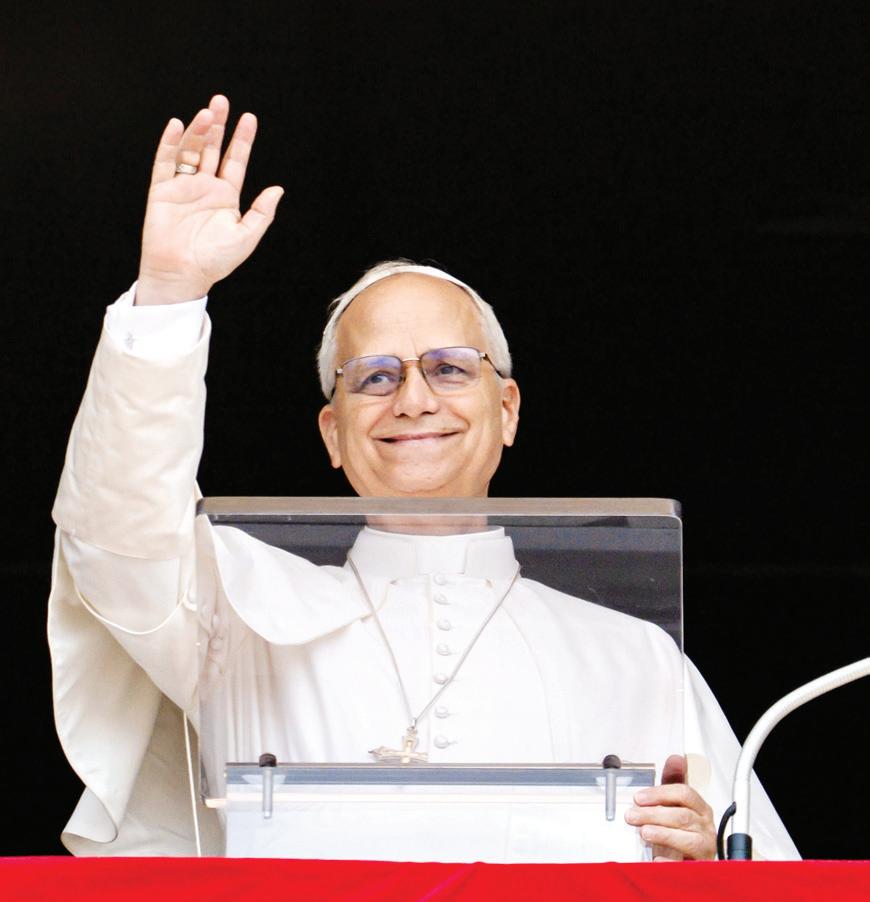
cultivado y empleado porque si no se seca y se devalúa. O bien termina perdido, a merced de quienes, como ladrones, se apropian de él para convertirlo simplemente en un objeto de consumo", afirmó.
"Las obras de misericordia son el banco más seguro y rentable" para invertir esos tesoros y talentos, dijo el Papa, "porque en él, como nos enseña el Evangelio, con ‘dos monedas’ incluso una pobre viuda puede convertirse en la persona más rica del mundo".
El Papa León XIV saluda a las personas reunidas en la Plaza de San Pedro para el rezo del Ángelus en el Vaticano el 10 de agosto de 2025 (Foto CNS/Vatican Media)
"Todo aquello que hace de cada uno de nosotros, en los designios de Dios, un bien único, inapreciable, un capital vivo, palpitante, que para crecer requiere ser
El Papa León instó a las personas a estar atentas para que, independientemente de si están en casa, en el trabajo o en su parroquia, no pierdan ninguna oportunidad de actuar con amor.
"Esta es la vigilancia que nos pide Jesús, habituarnos a estar atentos, dispuestos, sensibles los unos con los otros, como Él lo está con nosotros en cada instante", dijo el Papa.
22 de agosto de 2025
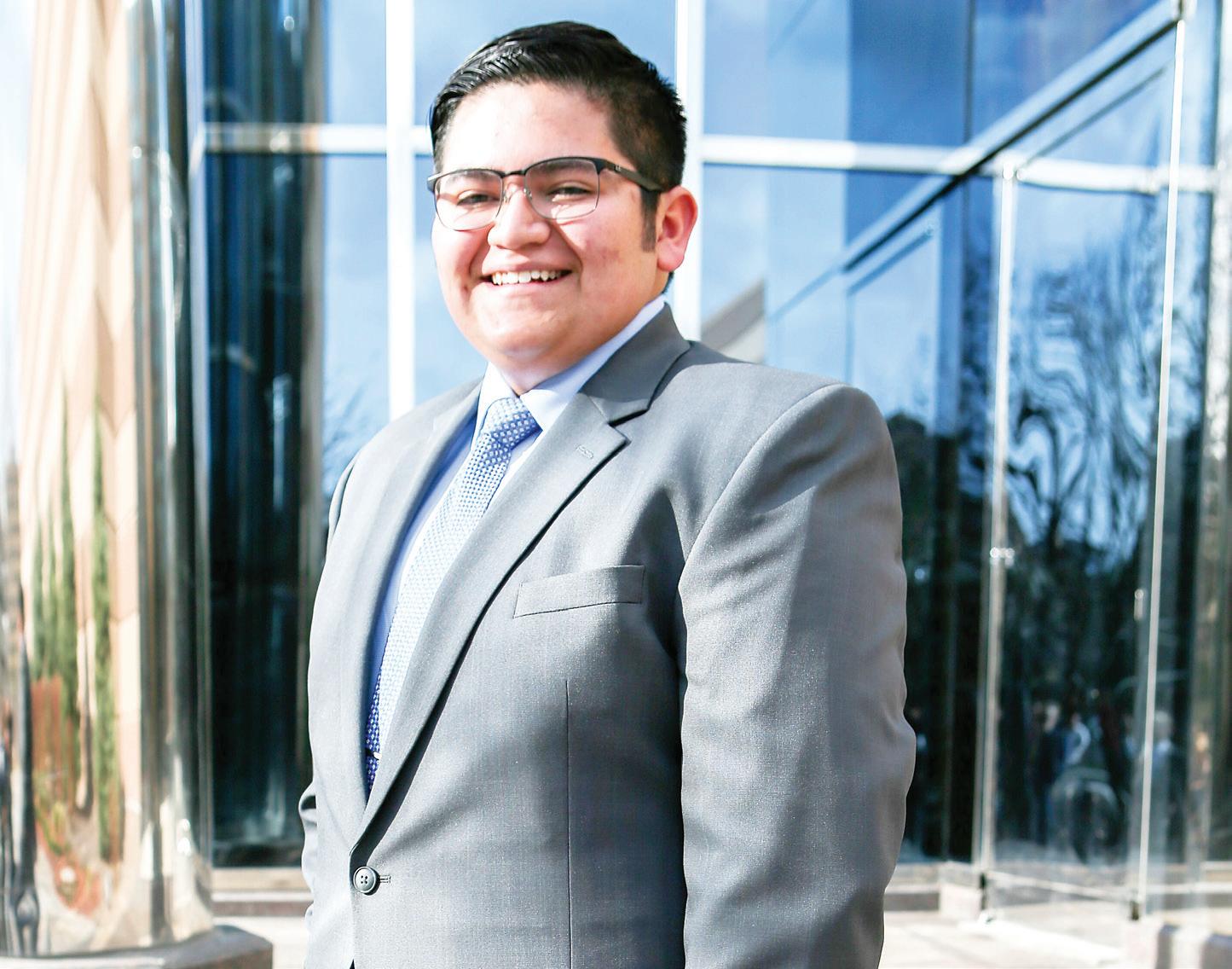
Kendrick Castillo, católico, aparece en una foto sin fecha. El estudiante de 18 años de la escuela STEM School Highlands Ranch, en Colorado, perdió la vida el 7 de mayo de 2019 al intentar proteger a sus compañeros de clase de un tirador. El obispo James R. Golka, de Colorado Springs, Colorado, anunció a finales de julio de 2025 que su oficina "estudiaría y discerniría" la "enorme tarea" de determinar si se abre una causa de canonización para Castillo. (Foto de OSV News/Caballeros de Colón)
COLORADO SPRINGS, Colorado (OSV News) – El obispo James R. Golka, de Colorado Springs, anunció a finales de julio que su oficina "estudiaría y discerniría" la "enorme tare" de determinar si se abre una causa de canonización para un adolescente que murió tras abalanzarse sobre el tirador durante un tiroteo en una escuela hace seis años en las afueras de Denver. Kendrick Castillo, de 18 años, fue el único estudiante que murió en el tiroteo de la escuela STEM Highlands Ranch el 7 de mayo de 2019, en el que otros ocho estudiantes resultaron heridos. Dos estudiantes fueron condenados por docenas de cargos relacionados con el tiroteo y sentenciados a cadena perpetua. Meses después de la muerte de Kendrick, los Caballeros de Colón le concedieron la membresía honoraria y otorgaron a sus padres la Medalla Caritas, su segundo mayor honor. Dos sacer-
dotes de la iglesia católica St. Mark en Highlands Ranch presentaron la petición y los materiales preliminares de apoyo para una posible causa de canonización de Kendrick al obispo Golka, diciendo que "vivió una vida tan llena de fe, servicio, santidad y cuidado de los demás". En una publicación de diciembre de 2019 en el sitio web de los Caballeros de Colón, John llamó a su hijo "un catalizador del amor" cuya devoción a Dios era "lo primero". El joven estaba a pocos días de graduarse en el instituto y tenía previsto estudiar ingeniería aeroespacial.
CIUDAD DEL VATICANO (CNS) – Dios nunca abandona a nadie, ni siquiera cuando la persona traiciona su amor, afirmó el papa León XIV. La esperanza cristiana surge de "saber que, aunque fracasemos, Dios nunca nos fallará. Aunque le traicionemos, él nunca dejará de amarnos", declaró el papa el 13 de agosto en su audiencia general semanal. Al llegar a la sala de audiencias del Vaticano, el papa León dio la bienvenida a los visitantes en inglés, español e italiano y explicó que la audiencia se celebraría en dos partes, en la sala y en la basílica de San Pedro, para que la gente no se viera obligada a permanecer fuera bajo el sol abrasador. El papa León tenía previsto abandonar el Vaticano tras la audiencia en dos partes para regresar a la villa papal de Castel Gandolfo, donde había pasado parte del mes de julio. La oficina de prensa del Vaticano informó de que permanecería hasta el 19 de agosto en la localidad, situada a unos 24 kilómetros al sureste de Roma.
NOTEPE, Nicaragua (OSV News) – El régimen sandinista gobernante en Nicaragua ha confiscado una destacada escuela católica, alegando sin pruebas que había funcionado como centro de "tortura" durante las protestas pasadas y renombrando el centro educativo en honor a un partidario asesinado. El Colegio San José de Jinotepe, un proyecto de la Congregación de las Hermanas Josefitas, fue "transferido al Estado" el 12 de agosto, según la copresidenta Rosario Murillo. La escuela pasó a llamarse "Héroe Bismarck Martínez", quien, según los partidarios del régimen sandinista, fue torturado y asesinado en Jinotepe durante las protestas de 2018, cuando los nicaragüenses salieron a las calles y exigieron la destitución del entonces presidente Daniel Ortega, ahora copresidente junto a su esposa, Murillo. Una investigación de la Comisión Interamericana de Derechos Humanos reveló que 355 personas murieron durante "la represión de las protestas sociales". Los detalles de la desaparición y muerte de Martínez siguen siendo un misterio, pero Ortega criticó a los obispos del país en 2019 por no condenar la muerte de Bismark. La incautación del Colegio San José de Jinotepe continuó la represión del régimen sandinista contra la Iglesia católica. Ni siquiera se tolera la disidencia más moderada y los sacerdotes deben vigilar sus palabras durante la misa. Cuatro obispos han sido exiliados de Nicaragua, junto con más de 250 sacerdotes, religiosas y seminaristas.
La Diócesis de Jackson se compromete a garantizar que ninguna persona a la que sirva la iglesia corra el riesgo de sufrir abuso o explotación sexual por parte del clero, los religiosos o el personal laico de la iglesia.
El bienestar espiritual de todas las víctimas, sus familias y otros miembros de la comunidad es de particular interés para la iglesia. De acuerdo con nuestra política, a todas las víctimas se les ofrece asesoramiento y atención pastoral.
Se alienta a cualquier persona que haya sido víctima de abuso o explotación por parte del clero, religioso o personal de la iglesia laica y aún no lo haya denunciado, a que lo haga. Nuestra coordinadora de asistencia a víctimas, Erika Rojas, una trabajadora social con licencia, está disponible para ayudar a hacer un informe. Números de contacto del Coordinador de Asistencia a las Víctimas: (601) 326-3736; (601) 326-3760.
Para obtener más información sobre las políticas y procedimientos diocesanos y para saber qué está haciendo la diócesis para crear un entorno seguro para todos, visite el sitio web diocesano en www.jacksondiocese.org y haga clic en "Protección de Niños."
Para hacer una denuncia de abuso o mal manejo de denuncias de abuso sexual por parte de un obispo, visite https://reportbishopabuse.org.

Vírgenes y Santos
Santa Rosa de Lima. 23 de agosto
Santa Mónica. 27 de agosto
San Augustín. 28 de agosto
Martirio de San Juan Bautista. 29 de agosto
Día del Trabajo. 1 de septiembre
San Gregorio Magno 3 de septiembre
Santa Teresa of Calcuta. 5 de septiembre




+Joseph R. Kopacz D.D., Ph.D. Bishop of Jackson
La natividad de la Santísima
Virgen María. 8 de septiembre
San Pedro Claver. 9 de septiembre
Envíenos sus fotos a editor@jacksondiocese.org
Síganos en Facebook: @DiócesisCatólicadeJackson Únase a lista de correos electrónicos Mande un texto: MSCATHOLIC a 84576
LÍNEA DIRECTA DE PREVENCIÓN DE FRAUDE
El Departamento de Asuntos Temporales de la Diócesis de Jackson ha contratado a Lighthouse Services para proporcionar una línea directa anónima de fraude financiero, cumplimiento, ética y recursos humanos. Esta línea directa permite un método adecuado para reportar sucesos relacionados con la administración temporal dentro de parroquias, escuelas y la oficina de cancillería.
www.lighthouse-services.com/ jacksondiocese Hispanohablante USA: 800-216-1288
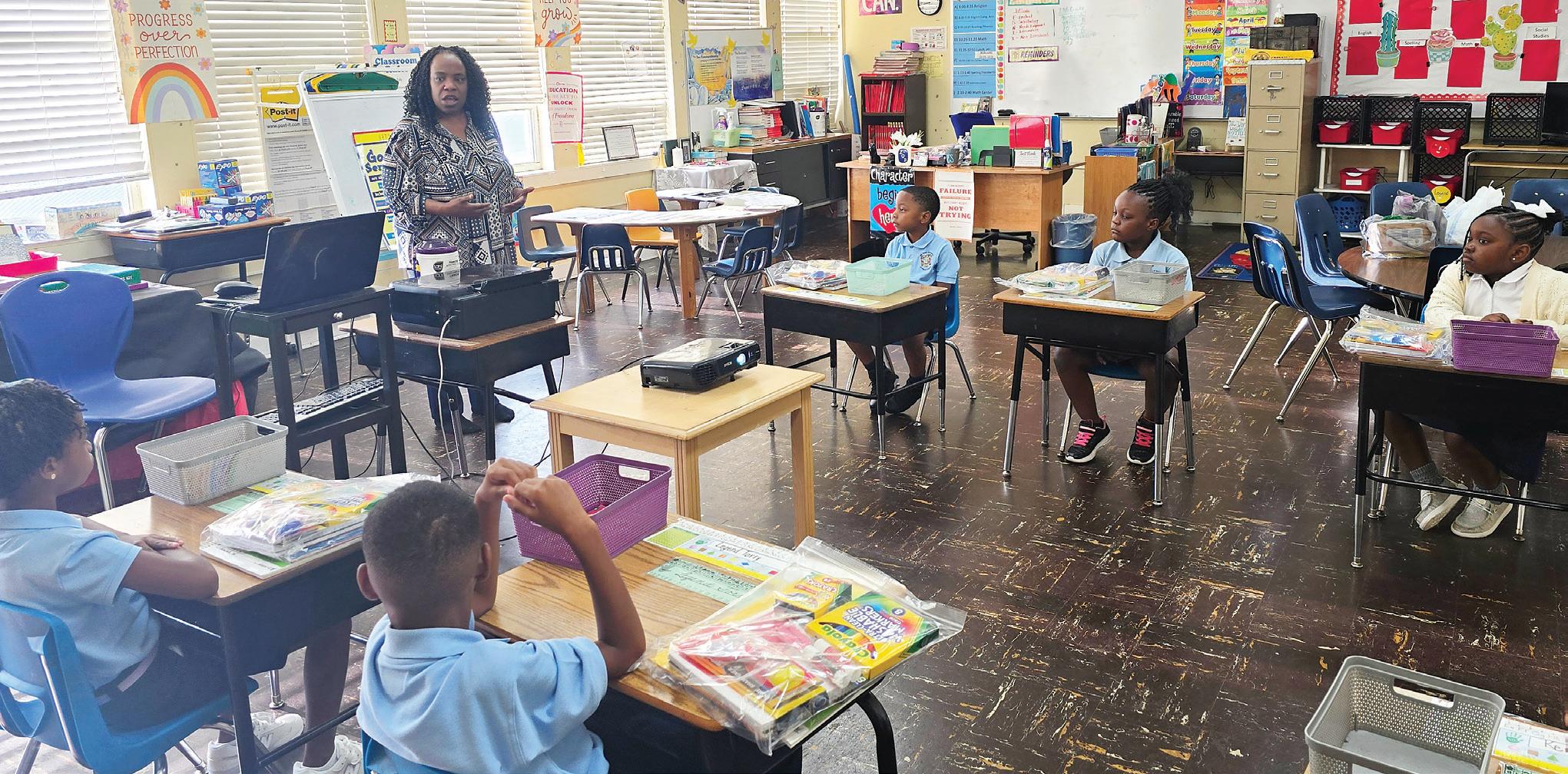



Students created bracelets that appear clear indoors but change color in sunlight and glow in the dark – an activity their teachers used to spark curiosity and excitement for learning.

By Staff RepoRtS
JACKSON – In April 2025, the Catholic Diocese of Jackson’s Office of Catholic Education successfully completed its system reaccreditation with Cognia, a globally recognized mark of educational quality.
First accredited as a system in 2019, the office underwent a comprehensive review that engaged administrators, teachers, students, parents and clergy in evaluating the effectiveness of diocesan educational operations. Through Cognia’s system accreditation, every school – large or small – benefits from consistent standards, aligned goals and the strategic sharing of resources, ensuring excellence across the diocesan network.
Cognia: a Mark of ExCEllEnCE
Cognia’s accreditation framework draws from more than 130 years of expertise, serving more than 36,000 schools in 90 countries. Through a combination of rigorous standards, research-based tools and per-
sonalized professional support, Cognia helps school systems set a high bar for academic achievement and organizational effectiveness.
The result is a visible, global designation that signals to families, educators and the broader community that the system is committed to excellence.
BEnEfits of Cognia aCCrEditation
Through system accreditation, the diocese benefits from a single, unified review every six years, replacing multiple individual school visits and saving time, resources and costs.
The process offers:
• A clear, objective view of what is working well and where improvements are needed.
• Transparency in policies and procedures, ensuring fairness and consistency across schools.
• More effective management of human and financial resources to meet the needs of every learner.
• Stronger collaboration and communication among schools, leaders and teachers.
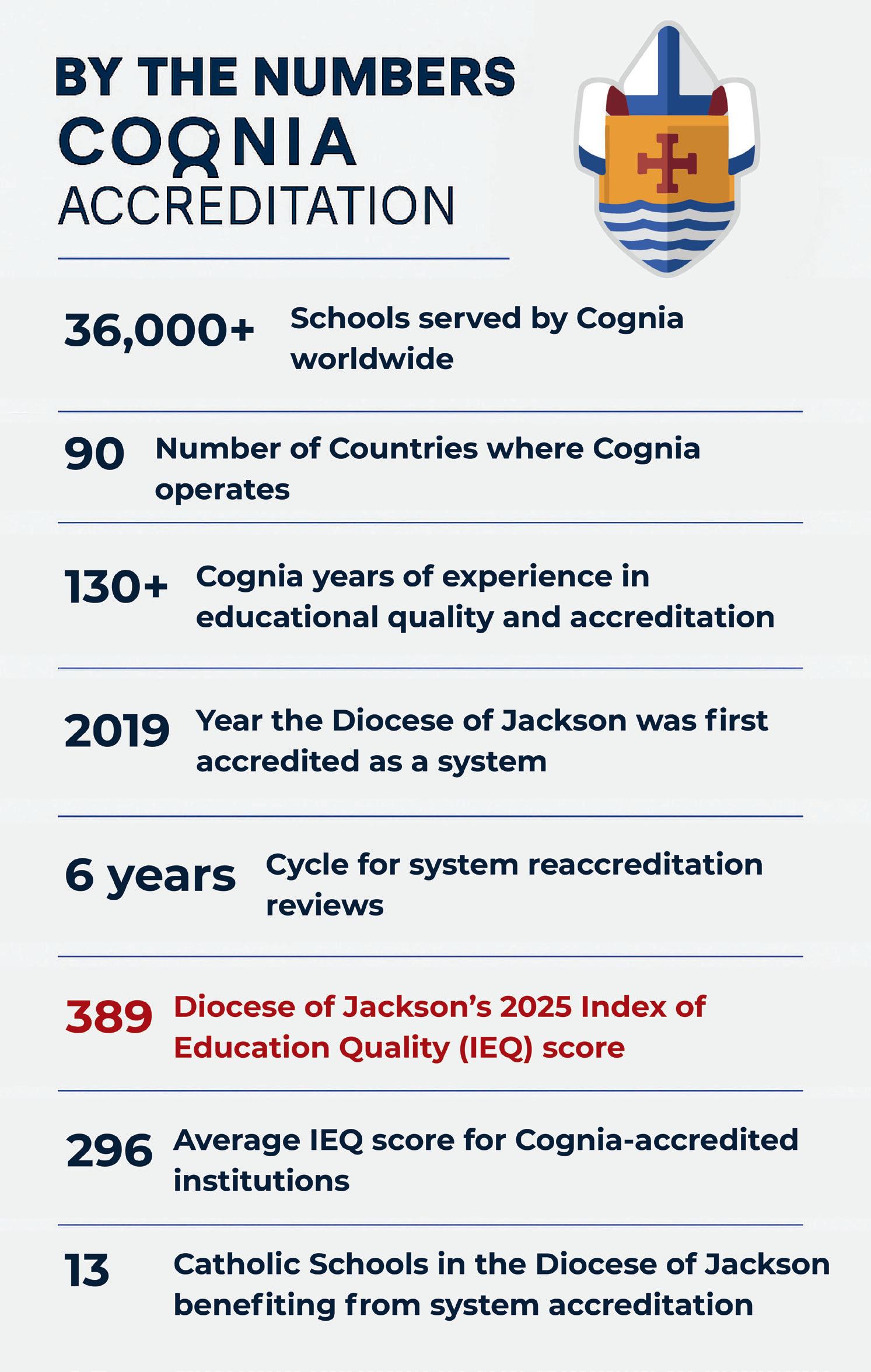
• Professional development rooted in real classroom data.
• Enhanced data analysis to inform decisions and track long-term progress.
Continuous iMprovEMEnt JournEy Cognia’s accreditation process is built on the belief that improvement is a continuous journey. Evaluators partner closely with schools to conduct a thorough self-assessment grounded in both perception and performance data.
Unlike accrediting bodies that rely on a checklist, Cognia emphasizes meaningful growth and measurable progress.
As Cognia affirms: Every institution, regardless of where they are today, can be better tomorrow.
This guiding principle shaped our approach throughout the reaccreditation process, inspiring us to reflect honestly, celebrate strengths and identify new opportunities for excellence.
How did wE do?
The recent Cognia Accreditation Engagement Review confirms that Catholic schools in the Diocese of Jackson are excelling in many areas while identifying opportunities for continued growth.
The review awarded the diocese an Index of Education Quality (IEQ) score of 389 out of 400 – well above the Cognia network average of 296.
Key strengths noted include:
• A deep commitment to Catholic identity.
• A strong culture of continuous improvement.
• Active stakeholder engagement.
• Collaborative professional development.
• Effective use of data to guide decisions.
Students benefit from safe, inclusive and supportive learning environments enriched by faith, academic rigor and leadership opportunities.
Growth areas identified include:
• Expanding professional learning that promotes student voice and ownership of learning.
• Encouraging teachers to engage in action research to strengthen instructional practices.
These recommendations will guide ongoing improvement efforts, ensuring that every child grows academically, socially and spiritually.
aCCountaBility tHat inspirEs ConfidEnCE
Choosing Cognia system accreditation is a choice to operate at the highest level of accountability and educational quality. It unites all diocesan schools under one collective vision – fostering a culture where every learner is known, valued and challenged to succeed.
For the families of our diocese, it means confidence that their children are part of a school system that meets rigorous global standards while remaining firmly grounded in the mission of Catholic education.
What are you waiting for? Come join us in spreading the Gospel through academic excellence in our Catholic schools.
(Visit https://jacksondiocese.org/schoolfinder to find one of our Diocesan Catholic Schools today.)

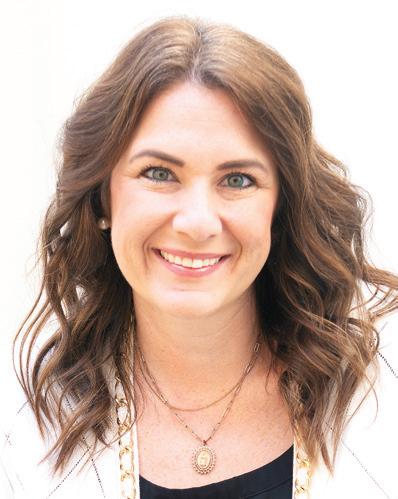
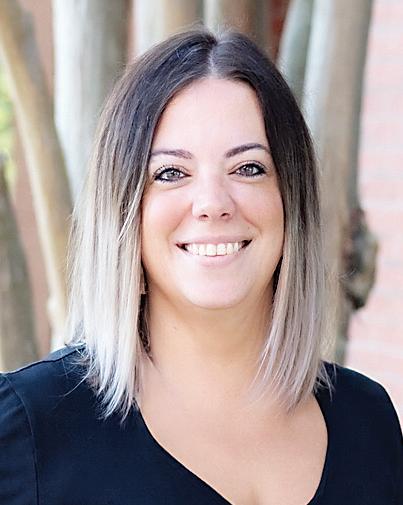
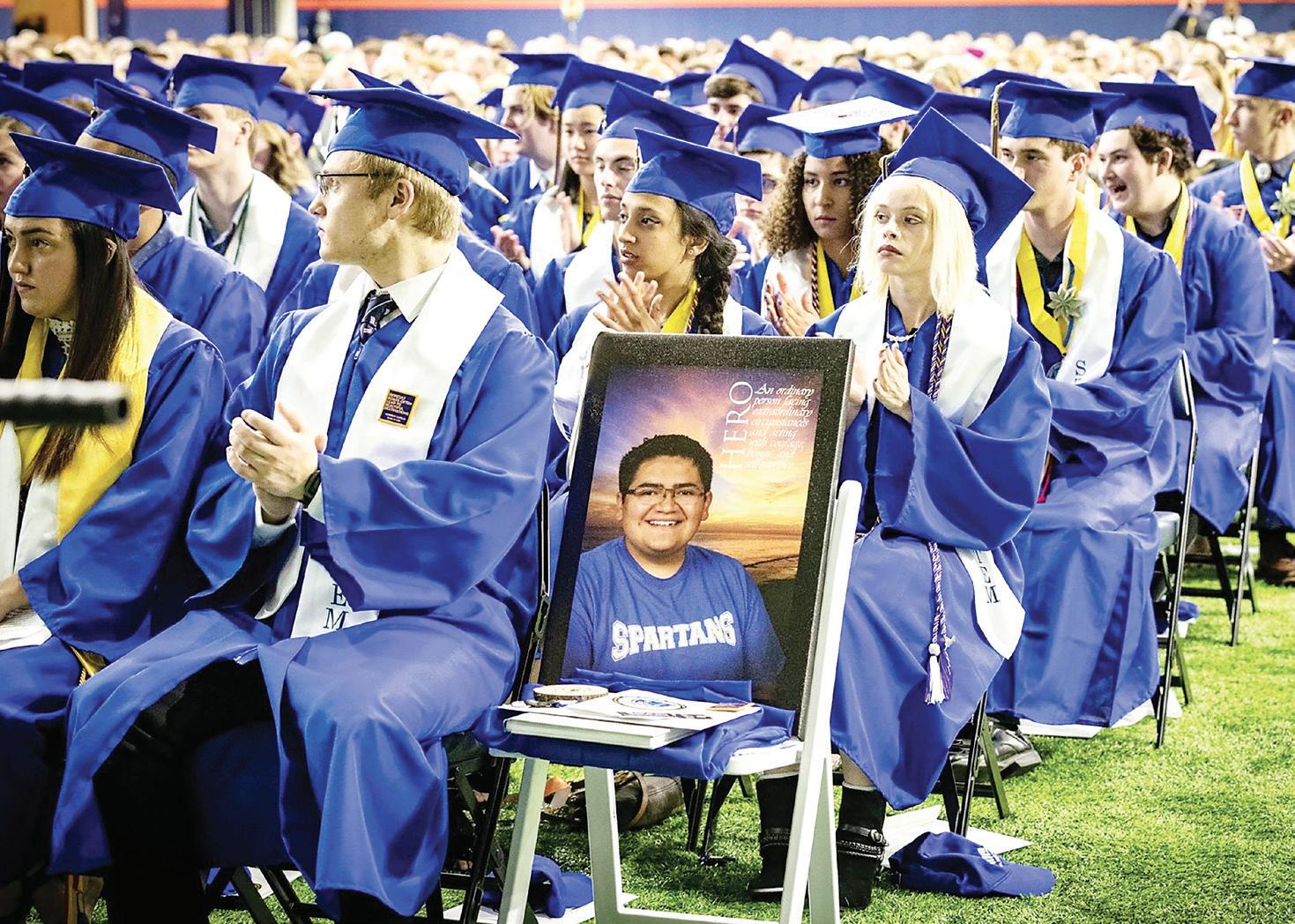
A chair sits empty in honor of Kendrick Castillo at the STEM School Highlands Ranch graduation in Colorado May 20, 2019. Castillo, a Catholic, was an 18-year-old senior at the school when he lost his life trying to protect fellow students from a shooter, and posthumously made an honorary Knight of Columbus. Bishop James R. Golka of Colorado Springs, Colo., announced in late July 2025 his office would “study and discern” the “massive undertaking” of determining whether to open a sainthood cause for Castillo. (OSV News photo/courtesy Knights of Columbus Council 4844)
COLORADO SPRINGS, Colo. (OSV News) – Bishop James R. Golka of Colorado Springs announced in late July his office would “study and discern” the “massive undertaking” of determining whether to open a sainthood cause for a teenager who was killed after he rushed the shooter during a school shooting incident six years ago in suburban Denver. Eighteenyear-old Kendrick Castillo was the only student who died in the STEM School Highlands Ranch shooting on May 7, 2019, that left other eight students injured. Two students, were convicted on dozens of charges for the shooting and sentenced to life imprisonment. Months after Kendrick’s death, the Knights of Columbus conferred honorary membership on him and gave his parents a Caritas Medal, their second highest honor. Two priests from St. Mark Catholic Church in Highlands Ranch submitted the petition and preliminary supporting materials for a possible sainthood cause for Kendrick to Bishop Golka, saying that he “lived a life that was so (much) one of faith and service and holiness and caring for others.” In a December 2019 posting on the Knights of Columbus website, John called his son “a catalyst of love” whose devotion to God was “number one.” The boy was days away from high school graduation and planned to study aerospace engineering.
WASHINGTON (OSV News) – A federal district court in Philadelphia on Aug. 13 struck down a religious conscience rule implemented by the first Trump administration exempting employers with religious or moral concerns from having to provide their employees with insurance coverage for contraceptives and other drugs or procedures to which they have an objection. The Little Sisters of the Poor, defendants in the suit, are expected to appeal. U.S. District Judge Wendy Beetlestone in Philadelphia found the rules, which expanded the parameters for the types of nonprofits that could use the exception, were not necessary to protect the conscience rights of religious employers. Becket, the religious liberty law firm representing the Little Sisters of the Poor in their ongoing legal efforts over their objections to paying for abortifacient drugs, sterilizations and contraceptives in their employee health plans, said the nuns would appeal the ruling “in the coming
weeks.” “The district court blessed an out-ofcontrol effort by Pennsylvania and New Jersey to attack the Little Sisters and religious liberty,” Mark Rienzi, president of Becket and lead attorney for the Little Sisters, argued in a statement.
VATICAN CITY (CNS) – God never gives up on anyone, even when the person betrays God’s love, Pope Leo XIV said. Christian hope flows from “knowing that even if we fail, God will never fail us. Even if we betray him, he never stops loving us,” the pope said Aug. 13 at his weekly general audience. Arriving in the Vatican audience hall, Pope Leo welcomed the visitors in English, Spanish and Italian and explained that the audience would be held in two parts – in the hall and in St. Peter’s Basilica – so people would not be forced to stay outside under the very hot sun. Pope Leo was scheduled to leave the Vatican after the two-part audience to return to the papal villa at Castel Gandolfo where he had spent part of July. The Vatican press office said he would stay until Aug. 19 in the town, which is about 15 miles southeast of Rome.
JINOTEPE, Nicaragua (OSV News) – Nicaragua’s ruling Sandinista regime has seized a prominent Catholic school, claiming without proof that it had operated a “torture” center during past protests and renaming the education facility for a slain partisan. The Colegio San José de Jinotepe, a project of the Congregation of the Josephine Sisters, was “transferred to the state” on Aug. 12, according to Co-President Rosario Murillo. The school was renamed “Héroe Bismarck Martínez,” who supporters of the Sandinista regime claim was tortured and murdered in Jinotepe during the protests of 2018,
when Nicaraguans took to the streets and demanded the ouster of then-President Daniel Ortega – now co-president with his wife, Murillo. An investigation by the Inter-American Human Rights Commission found 355 individuals died during “the repression of social protests.” Details of Martinez’s disappearance and death remain mysterious, but Ortega criticized the country’s bishops in 2019 for not condemning Bismark’s death. The seizure of the Colegio San José de Jinotepe continued the Sandinista regime’s crackdown on the Catholic Church. Even the most mild dissent is not tolerated and priests must watch their words during Mass. Four bishops have been exiled from Nicaragua, along with more than 250 priests, women religious and seminarians.
NAGASAKI, Japan (OSV News) – In his homily at a solemn Peace Memorial Mass Aug. 9, Archbishop Peter Michiaki Nakamura of Nagasaki issued a passionate plea: “We must abandon the fists, weapons, and tools of violence we hold in our hands, and stop creating and using nuclear weapons. Let us use our hands to love and embrace others.” The Mass was offered at Urakami Cathedral in Ngagasaki on the exact day that 80 years ago the U.S. dropped an atomic bomb on that city – which followed the Aug. 6, 1945, U.S. atomic bombing of Hiroshima. The concelebrants at the Mass included the four U.S. prelates participating in a “Pilgrimage of Peace”: Washington Cardinal Robert W. McElroy, Chicago Cardinal Blase J. Cupich, Archbishop Paul D. Etienne of Seattle, and Archbishop John C. Wester of Santa Fe, New Mexico. For the pilgrimage, the four prelates were joined by U.S. Catholic university leaders and students to commemorate the 80th anniversary of the bombings and to pray together for peace and for a world without nuclear weapons. After the Mass, the U.S. pilgrims and Japanese Catholics marched from Urakami Cathedral to Nagasaki Peace Park in a torchlight procession symbolizing the light of faith and hope for a nuclear-free future.

BY MARY WOODWARD
Recently, I assisted in setting up for the Bishop’s Ball, Catholic Charities’ annual fundraiser. This year the event was held at the Two Mississippi Museums in Jackson, a wonderful complex featuring the state’s history from prehistoric times to the present, and a whole building devoted to the civil rights movement.
During a break from setting up, I went upstairs to view a special exhibit on Hurricane Katrina. Aug. 28 marks the 20th anniversary of the catastrophic storm that claimed more than 1,800 lives and caused more than $125 billion in property damage. The exhibit was a collection of photographer Melody Golding’s work enlarged for the space and various items salvaged from the storm that are part of the Mississippi Archives and History Collection.
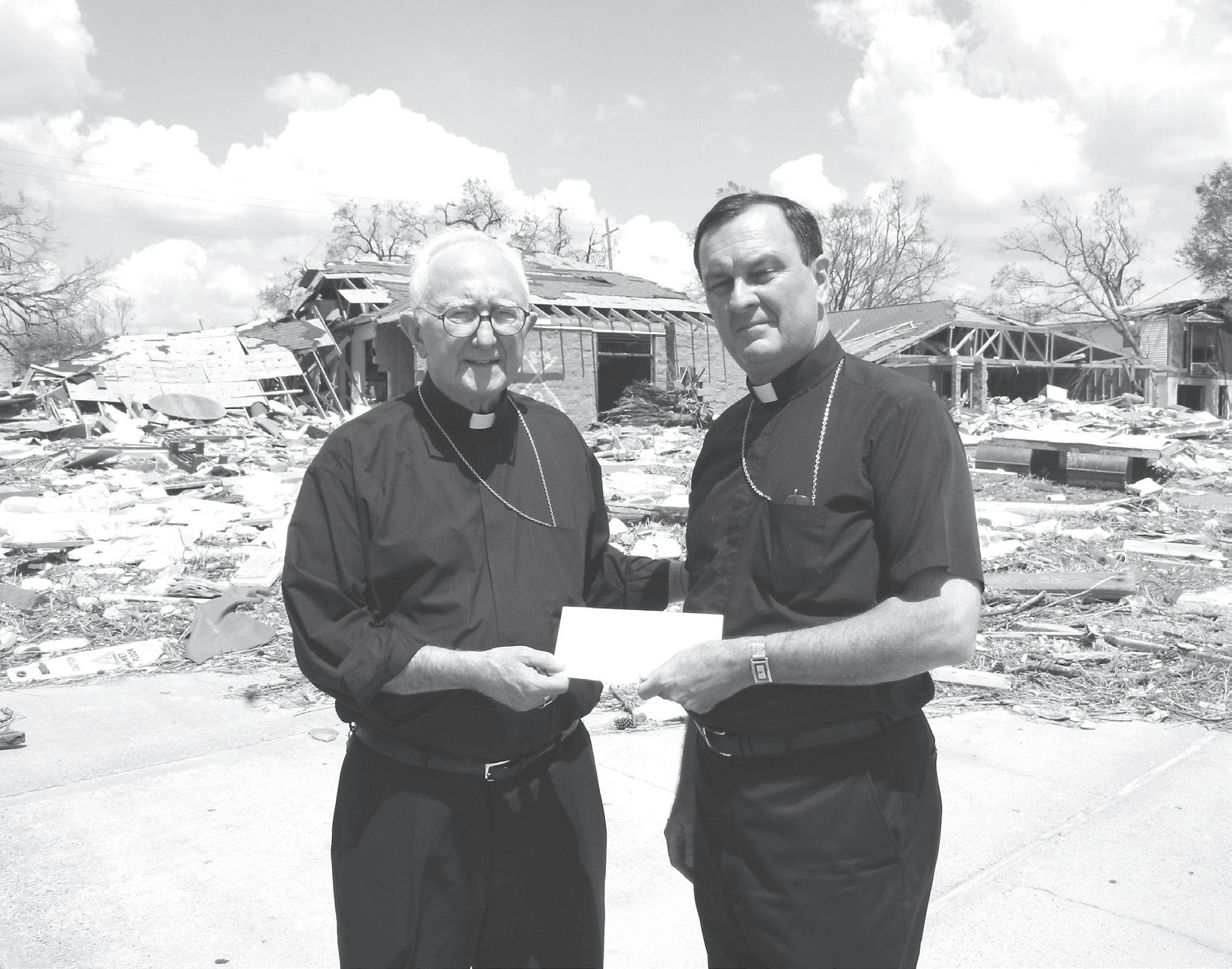
Also included were displays of facts and figures and one interesting list of “Things We Learned.” On this list were simple realizations such as: “We can all ride in one car”; “A bag of ice is better than a sack of gold”; “Any brand of co ee will do”; and “Your neighbor is part of the family.”
Thinking back to 20 years ago as we approach the anniversary, I remember all the moving parts the diocese and Catholic Charities coordinated in the aftermath of that devastating storm. I remember all the hotels and shelters in Jackson being filled with Gulf Coast refugees fleeing the path. I remember taking blankets, pillows and Bibles to the Coliseum in downtown Jackson, which was serving as a shelter and was unprepared for the number of people who arrived.
I remember watching the helicopter flyover of the Coast on my battery-operated mini TV the morning after the storm and thinking, this is not real. I remember dragging a 10-foot turret from the cathedral’s steeple into the bishops’ burial ground to keep it safe from copper thieves.
I remember making a trip down to the Coast a few months after the storm with Bishop William Houck, who was then serving as president of Catholic Extension in Chicago. He was bringing prayers, greetings and a check to the Diocese of Biloxi, which su ered immense damage from the tidal surge, flooding and winds of Katrina.
There are so many memories that the entire World Wide Web could not hold them. As I was preparing for this column, I went through some of the old press releases we had done as part of the ongoing disaster recovery plan – one that came together on the fly because no one ever expected something such as Katrina.
Here is one of those releases that shows the many moving parts mentioned above:
Catholic Diocese of Jackson/Catholic Charities Jackson September 2005
Schools:
• The diocesan Catholic school system has taken in 585 displaced students.
• Parents have not been charged enrollment fees or tuition.
• Schools, through community outreach, are providing uniforms, school supplies and backpacks free of charge.
• We have established a Diocesan Katrina Relief Education Fund to assist schools incurring additional expenses to serve displaced students.
Rural areas:
• Catholic Charities and the Diocese of Jackson have “adopted” the rural areas around Hattiesburg in the Diocese of Biloxi.
• Facilitated with St. Thomas Catholic Church in Hattiesburg for the church to become a FEMA distribution site.
• Diverted many trucks with emergency supplies to this site for distribution.
• Provided a mobile truck to deliver supplies to rural communities.
• Helped Purvis set up a FEMA site.
• Mass was o ered at the Coliseum shelter for Catholics staying there.
• Parish dinners and breakfasts have been taken to shelters, and people in shelters have been brought to the churches for Mass and hospitality.
• Surveying temporary housing options.
• Emergency food pantries set up.
• Helping individuals and families set up homes with supplies.
• Assisting evacuees still in hotels with food and rent assistance.
• Hosting relief volunteers in private homes of parishioners.
As I read through this list, I remember how well everyone worked together under incredibly di cult circumstances. Tempers did flare at times because it was very hot and there was no power for weeks, even as far north as Jackson, but those flare-ups were met with understanding and forgiveness.
Collectively, we remembered that “we can all ride in one car.”
(Mary Woodward is Chancellor and Archivist for the Diocese of Jackson.)
• Currently serving hard-hit small communities including Foxworth, Columbia, Bassfield, Sumrall, Seminary, Mize, Moselle, Eastabuchie, Richton and Laurel.
Jackson distribution warehouses:
• 40 Boling Street: The state of Mississippi under Gov. Haley Barbour has taken control of this site, which was previously coordinated by the Seventh-day Adventists and Catholic Charities. Ships sorted bulk, palletized items only.
• 1425 Ridgeway Street: The state has asked Catholic Charities to coordinate this second warehouse to take unsorted goods, sort and palletize them, and ship them to Boling Street for distribution to needy areas.
• Ellis Avenue: We have our own warehouse with funds donated by the Knights of Malta to store items such as school supplies temporarily so they may be sent to our newly bulging schools.
Parish e orts:
• Shelters for evacuees as well as power company workers.
• Pastoral visits to shelters.
• Provided laundry service to shelters.

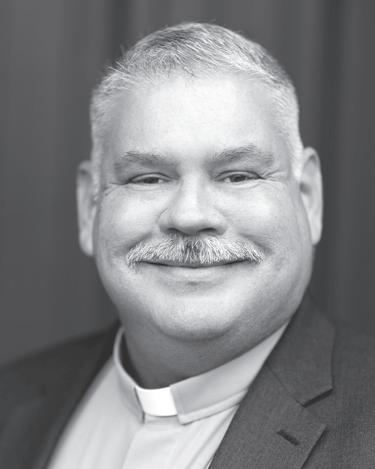

I can’t be bothered
BY SISTER ALIES THERESE
As in a responsorial psalm, repeat after me: God is in the obstacle.
Or so they thought. Or so they said. However, for some, in that desert, after a little while, when the buzz quiets, something else takes over – a kind of resistance, acedia. It is not just monks and nuns who su er this; married people, singles, anyone can fall prey.
Kathleen Norris, in her exceptional book “Acedia & Me,” tells how the word itself has gone through a myriad of definitions since the earliest writings in “The Praktikos” of Evagrius Ponticus (345–399).
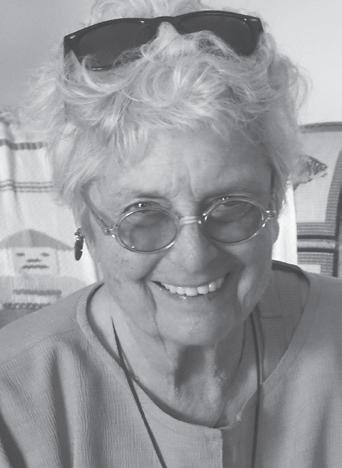
Some are: “Acedia: the deadly sin of sloth; or spiritual torpor and apathy,” according to Webster’s Third New International Dictionary. The Oxford English Dictionary defines “accidie” as heedlessness, torpor … a non-caring state. The Online Medical Dictionary describes “acedia” as a mental syndrome whose chief features are listlessness, carelessness, apathy and melancholia.
Repeat: God is in the obstacle.
When the seeker would ask about this struggle, Abba Poemen would advise: “Watchfulness, self-knowledge, and discernment. These are the guides of the soul,” according to “Desert Fathers and Mothers” by Jonathan Wilson-Hartgrove.
Isadore of Pelusia o ered this: “Many desire virtue, but fear to go forward on the way that leads to it, while others consider that virtue does not even exist. So, it is necessary to persuade the former to give up their habitual idleness, and to teach the others what virtue really is.”
Amma Syncletica said there is an asceticism determined by the enemy and practiced by his disciples. She asked, “How are we to distinguish between the divine and demonic tyranny?” Her answer was: “We must arm ourselves in every way against the demons. For they attack us from outside, and they also stir us up from within; and the soul is like a ship when great waves break over it, and it sinks because the hold is too full,” as recorded in “The Sayings of the Desert Fathers” by Benedicta Ward. And you ask, how is God in the obstacle?
Amma Theodora, renowned for her wisdom, tells us it is good to live in peace, practicing perpetual prayer. “However,” she says, “you should realize that as soon as you intend to live in peace, at once evil comes and weighs down your soul through accidie, faintheartedness and evil thoughts. It also attacks your body through sickness, debility, weakening of the knees and all the members. It dissipates the strength of the soul and body, so that one believes one is ill and no longer able to pray,” also from “The Sayings of the Desert Fathers.”
Yes, you’ve had this experience. You sit down to pray, feeling quite good, knowing you will talk with God … when you remember your shopping list, calling your mother or watering the plants. It will only take a minute, so you do that thing. Then the phone rings, the TV goes o , the kids pack in from school … and it keeps happening. Those little demons of distress wiggle into your soul, and it seems there’s not much you can do about the indi erence, weariness, lax intentions or dryness that grows.
Cassian wrote that “if we are overcome by sloth or carelessness and spend our time in idle gossip, or are entangled in the cares of this world and unnecessary anxieties, the result will be that a sort of species of tares will spring up and occupy our hearts, and as
our Lord and Savior says, wherever the treasure of our works or purpose may be, there also our heart is sure to continue.”
Sloth is a culpable lack of physical or spiritual e ort; acedia or laziness. One of the capital sins, according to the Catechism of the Catholic Church, sins are called “capital” because “they engender other sins or vices.” (1866) This spiritual e ort manifests itself mainly during prayer and in the life of one given to God; this is a disaster. “Someone said to Antony, ‘Pray for me.’ The old man said to him, ‘I will have no mercy upon you, nor will God have any, if you yourself do not make an e ort,’” writes Benedicta Ward from Carrigan’s “The Wisdom of the Desert Fathers and Mothers.”
– the very one given to me by God, you try to think. Mark Cuban, the entrepreneur, quipped: “Talent without e ort is wasted talent. And while e ort is the one thing we can control, applying that e ort intelligently is next on the list.”
Obstacle is in the
Acedia in full bloom looks like frustration or weariness, experienced as sadness – “sadness in relation to a spiritual good … a retreat from the divine good itself,” as St. Thomas Aquinas says in “Summa Theologica.” I just don’t care. I can’t be bothered.
Kenneth Russell, in his article in “Review for Religious,” writes that “acedia is a gray morning’s inclination not to intensify the original yes to God, community or spouse ... choose to swim no further. ... What they really opt for is some means of control over their own comfort. ... The victims of acedia tread water and console their anxieties with sleep or attempt to dissipate them in one distraction after another.”
David of Augsburg (d. 1272) described “accidie” in three kinds: the first is bitterness of mind that cannot be pleased by anything cheerful or wholesome; the second, a kind of indolent torpor loving sleep and comfort; and the third, “a weariness in such things as belong to God, praying without devotion, rushing through, thinking of other things as not to be bored.” Chaucer’s “Parson’s Tale” notes that “envy and anger cause bitterness, which is the mother of acedia, and takes from a man the love of all goodness. Then is acedia the anguish of the troubled heart; as St. Augustine says, ‘It is the sadness of goodness and the joy of evil.’”
How can God be here?
It has been a very hot summer; maybe your prayer is distressed?
Think of the Noonday Devil, as acedia is often called – for at the height of noon the sun beats down, the pray-er is hungry, nothing is going right, and one could not be convinced God is in these obstacles. Give up. But I was meant for this – this community, this vocation, this spouse. Or was I? The demon of doubt squeaks in. This is where my talent lies
Finally, Abbot Jean-Charles Nault, OSB, sums it up when he writes that “acedia is the enemy of spiritual joy ... a profound withdrawal into self to save one’s freedom at any price ... no longer any room for an abandonment to the other or for the joy of gift. What remains is sadness or bitterness ... distancing oneself, separated from others and likewise separated from God,” as he wrote in “Enemy of Spiritual Joy” in Communio journal.
What to do: Intensify your prayer. Don’t look for distractions. Be vigilant. Don’t settle for being less than you can. Don’t refuse responsibility. Do for others. Search for God in the obstacles. Life in God is not a spectator sport.
“And should our branches be broken o by negligence, carelessness, disdain or ruin, may these reckless prunings carry even more significance as symbols of peace in a broken world,” wrote Sister M. Guider, OSF.
God is in the obstacles.
God has found you.
Blessings.
(sister alies therese is a canonical hermit who prays and writes.)
The Diocese of Jackson is committed to ensuring that no one being served by the church be (is) at risk of sexual abuse or exploitation by clergy, religious or lay church personnel. The spiritual well-being of all the victims, their families and others in the community is of particular concern to the church. In accordance with our policy, all victims are o ered counseling and pastoral care.
Anyone who has been a victim of abuse or exploitation by clergy, religious or lay church personnel and has not yet reported it is encouraged to do so. Our victim assistance coordinator, Erika Rojas, a licensed social worker, is available to assist in making a report. Please contact her at (601) 326-3736.
For more information about diocesan policies and procedures and to learn what the diocese is doing to create a safe environment for everyone, please visit the diocesan website at www.jacksondiocese.org and click on “Protection of Children.”
To report an allegation of abuse or mishandling of allegations of sexual abuse by a bishop, please visit https://reportbishopabuse.org.



+Joseph R. Kopacz D.D., Ph.D. Bishop of Jackson
Don’t settle for less; God is waiting to transform your life, pope tells youth
By Carol Glatz
ROME
(CNS)
– The fullness of life depends on how much one joyfully welcomes and shares in life while also living with a constant yearning for those things that only come from God, Pope Leo XIV told young people.
“Aspire to great things, to holiness, wherever you are. Do not settle for less. You will then see the light of the Gospel growing every day, in you and around you,” he said in his homily during Mass concluding the Jubilee of Youth Aug. 3.
The outdoor Mass, held in Rome’s Tor Vergata neighborhood, marked the culmination of a week-long series of events for the Jubilee of Youth.
More than 1 million people were estimated to be gathered across the 130 acres that had been prepared for the morning Mass, the prayer vigil the evening before, and for the hundreds of thousands of people sleeping overnight.
After touching down by helicopter less than 12 hours after leaving the evening vigil, the pope rode in the popemobile throughout the open areas – dotted with tents and tarps, and filled with young people, cheering, waving their nation’s flag, and sometimes launching at him shirts and gifts.
“Good morning!” he said in six languages from the stage set up for the Mass.
“I hope you all rested a little bit,” he said in English. “We will shortly begin the greatest celebration that Christ left us: his very presence in the Eucharist.”
He said he hoped the concluding Mass would be “a truly memorable occasion for each and every one of us” because “when together, as Christ’s church, we follow, we walk together, we live with Jesus Christ.”
In his homily during the Mass, the pope again highlighted the importance of the Eucharist, as “the sacrament of the Lord’s total gift of himself to us.”
It is Christ, the Risen One, he said, “who transforms our lives and enlightens our affections, desires and thoughts.”
“We are not made for a life where everything is taken for granted and static, but for an existence that is constantly renewed through the gift of self in love,” he said.
Much like a field of flowers, where each small, delicate stem may dry out,
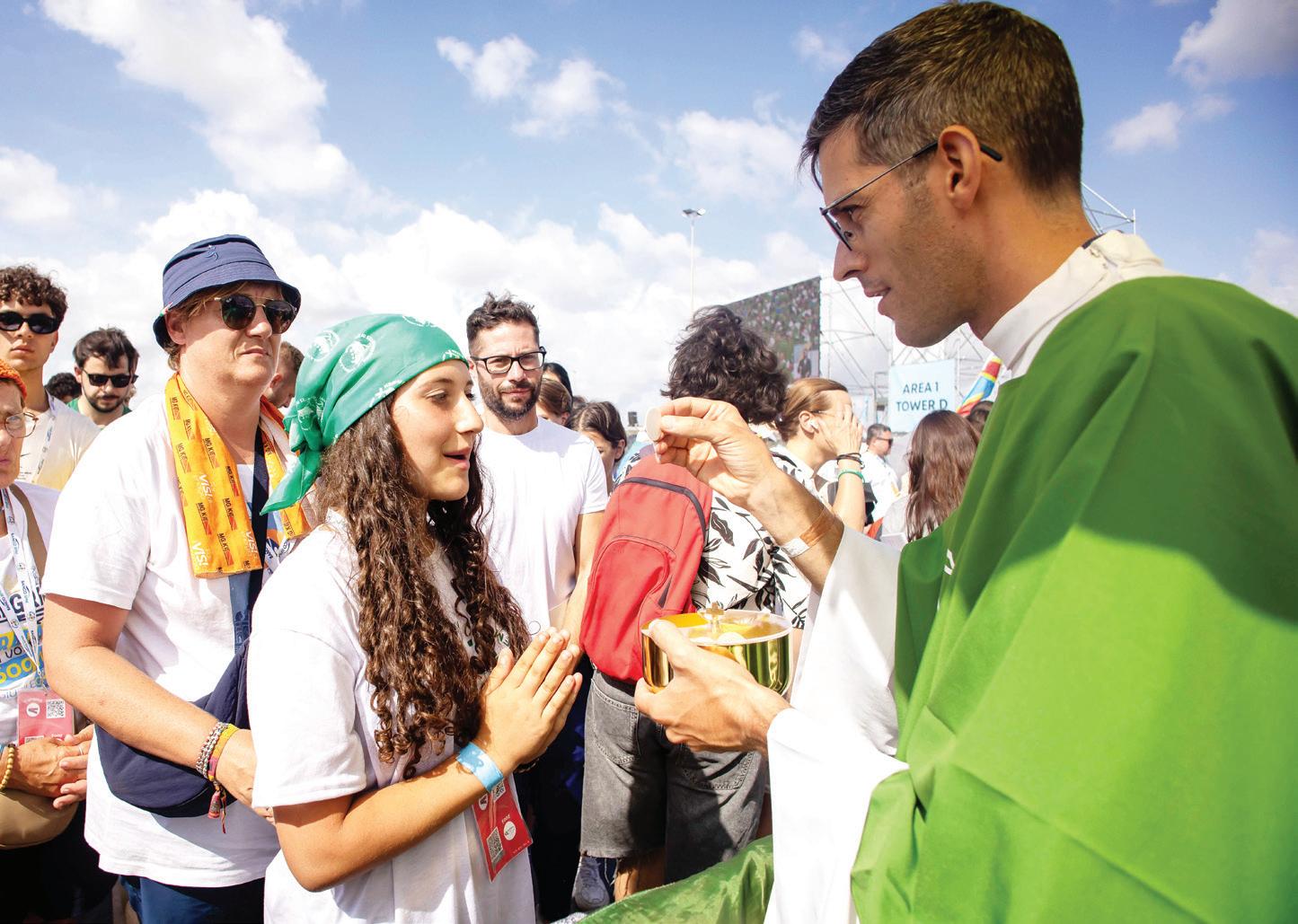
the Jubilee of Youth in Rome’s Tor Vergata neighborhood Aug. 3, 2025. (CNS photo/Pablo Esparza)
become bent and crushed, he said, each flower is “immediately replaced by others that sprout up after them, generously nourished and fertilized by the first ones as they decay on the ground. This is how the field survives: through constant regeneration.”
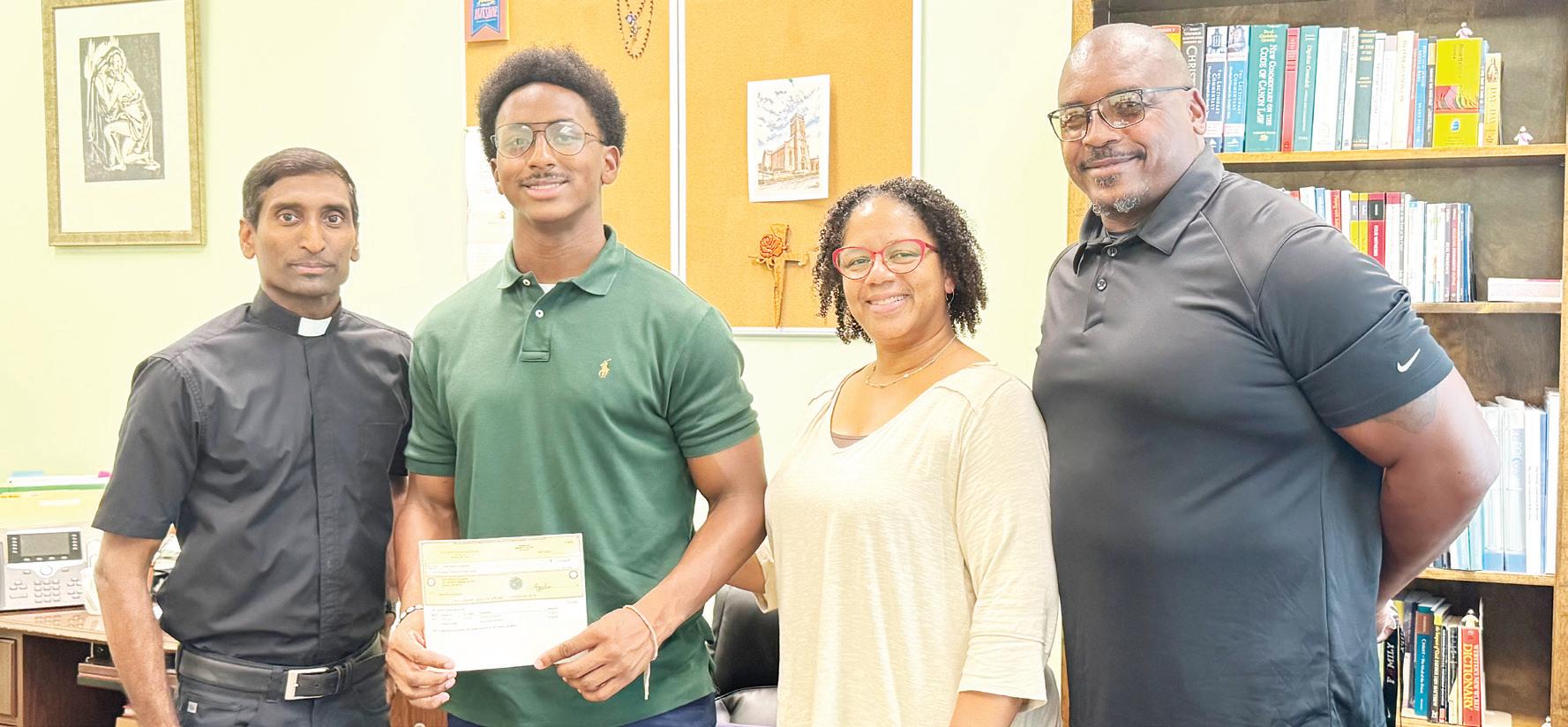
– Meridian High School valedictorian Dane Hill was awarded the first Father Cosgrove Scholarship by St. Joseph Catholic Church. Pictured, from left, Father Augustine Palimattam, Dane Hill, Kim Hill and Demetrius Hill. (Photo courtesy of parish)
By Staff reportS
MERIDIAN – St. Joseph Catholic Church has awarded the first Father Cosgrove Scholarship to Dane Hill, valedictorian of Meridian High School’s Class of 2025.
The scholarship honors Father Frank Cosgrove, former pastor of St. Joseph and St. Patrick Catholic churches and St. Patrick School in Meridian. Now retired at St. Catherine’s Village in Madison, Cosgrove is remembered for his wisdom, humor and deep pastoral care.
Thanks to an anonymous donor, the par-
ish established a $10,000 scholarship fund to be awarded annually to the school’s valedictorian for as long as funds are available.
“Father Cosgrove has had a profound and lasting impact on our community,” said Father Augustine Palimattam, current pastor of the Catholic Community. “This scholarship honors his legacy by encouraging and supporting the academic and moral excellence he always championed.”
Hill, the first recipient, will attend Clark Atlanta University this fall.
“This is why we continually aspire to something ‘more’ that no created reality can give us; we feel a deep and burning thirst that no drink in this world can satisfy,” he said. “Knowing this, let us not deceive our hearts by trying to satisfy them with cheap imitations!”
Pope Leo urged the young people to listen to that yearning and “turn this thirst into a step stool, like children who stand on tiptoe, in order to peer through the window of encounter with God,” who has been “waiting for us, knocking gently on the window of our soul.”
“It is truly beautiful, especially at a young age, to open wide your hearts, to allow him to enter, and to set out on this adventure with him towards eternity,” he said.
Speaking briefly in English, the pope said, “There is a burning question in our hearts, a need for truth that we cannot ignore, which leads us to ask ourselves: what is true happiness? What is the true meaning of life? What can free us from being trapped in meaninglessness, boredom and mediocrity?”
“Buying, hoarding and consuming are not enough,” he said. The fullness of existence “has to do with what we joyfully welcome and share.”
“We need to lift our eyes, to look upwards, to the ‘things that are above,’ to realize that everything in the world has meaning only insofar as it serves to unite us to God and to our brothers and sisters in charity, helping us to grow in ‘compassion, kindness, humility, meekness and patience,’ forgiveness and peace, all in imitation of Christ,” he said.
Evoking St. John Paul II’s words during the XV World Youth Day prayer vigil held in the same spot 25 years ago, Pope Leo reminded the young people that “Jesus is our hope.”
“Let us remain united to him, let us remain in his friendship, always, cultivating it through prayer, adoration, Eucharistic communion, frequent confession, and generous charity, following the examples of Blessed Pier Giorgio Frassati and Blessed Carlo Acutis, who will soon be declared saints,” he said.
Wishing everyone “a good trip home,” he encouraged the young people to “continue to walk joyfully in the footsteps of the Savior, and spread your enthusiasm and the witness of your faith to everyone you meet!”

BY JOANNA PUDDISTER KING
JACKSON – Two Catholic schools in the Diocese of Jackson have earned national recognition for their focus on science, technology, engineering and math education.
Annunciation School in Columbus and St. Anthony School in Madison recently received STEM certification through Cognia, a global nonprofit that accredits schools and educational institutions. The designation recognizes schools that integrate STEM across student learning and meet rigorous standards for innovation, critical thinking and problem solving.
Annunciation is the first school in the Golden Triangle area, and only the second in Mississippi, to earn the honor. St. Anthony became the first school in the state to achieve certification in 2017 and recently renewed its status.
At Annunciation, Principal Joni House said the recognition is a reflection of her teachers’ commitment to preparing students for the future. “STEM education is imperative in today’s technology-driven world,” House said. “This Cognia certification confirms what we already know here at ACS: that our students leave here able to make an impact on whatever sector they choose to work in.”

“It a rms to parents, students and stakeholders that we are committed to fostering student engagement, critical thinking, collaboration and strong academic performance,” Cowger said.
Stephanie Brown, dean of academics and STEM certification review coordinator, said St. Anthony weaves its Catholic identity and the arts into STEM to form STREAM.
“When our Catholic identity and commitment to the arts are intertwined with STEM programming, we help students become well-rounded disciples of Christ who have the tools and skills they need to be change makers,” Brown said.
One example was a PreK lesson on “The Three Little Pigs.” After hearing the story, students built houses of straw, sticks and bricks, then designed their own stronger structures. The activity used the engineering design process while also teaching teamwork and respect for one another as children of God.
The school broadens STEM into STREAM, adding religion and art. Teachers introduce STREAM as early as preschool through lessons that range from solar-powered car projects to science fairs and guest presentations from community members.
“The purpose of STREAM is to teach students how to approach problems using their original ideas,” said Nichole Cancellare, Annunciation’s STREAM
coordinator. “While the focus is on STREAM subjects, it can encompass any subject. ... Our community is involved in a lot of our activities, including STREAM Days and STREAM Career Expos. We rely heavily on our community partners, such as NASA, Mississippi State University and MSMS, to branch out our STREAM learning and for teacher professional development.”
At St. Anthony, Principal Anne Cowger said the re-certification highlights the school’s commitment to 21st-century learning.
Cognia’s STEM certification process is based on performance standards that emphasize creating a STEM community, building a learning culture, and providing authentic experiences and outcomes. More than 400 schools worldwide have achieved the recognition.
“High-quality learning can transform lives, communities and the world,” Cognia notes in its standards.
With Annunciation and St. Anthony earning the distinction, Catholic schools in the diocese continue to show that students can be prepared to thrive in a rapidly changing world while remaining grounded in faith.
BY STAFF REPORTS
JACKSON – Get ready for a day of golf, giving and good company at the 43rd annual Bishop’s Cup Golf Tournament. Set for Thursday, Sept. 11, at Lake Caroline Golf Club, this longstanding tradition invites players of all experience levels – men and women – to enjoy an afternoon of friendly competition and community.
Steve Carmody, who has led the tournament for more than 33 years, said, “We’re grateful for the incredible support this tournament receives. It’s a fun and meaningful way to bring people together while supporting the needs of our parishes and schools. We look forward to seeing Bishop Kopacz and so many familiar faces on the course.”
Whether an avid golfer or just in it for fun, the Bishop’s Cup has something for all. Tee-o begins at 1 p.m., and participants can register individually or with a team. Registration is $200, and priests play for free. Also, the excitement builds with a $10,000 hole-in-one prize waiting on the course.
Registration includes a pre-tournament lunch, 18 holes of golf with a cart, snacks and drinks throughout the course, a commemorative golf towel and balls, and dinner with two drink
tickets at The Mermaid Café.
Not a golfer? Dinner-only tickets are available for $40 and include both silent and live auctions to support a meaningful cause.
Rebecca Harris, executive director of the Catholic Foundation, said, “We’re thrilled to see the Bishop’s Cup continue to grow year after year. It’s always a joy to welcome back our supporters and sponsors, whose generosity makes this day – and our mission – possible.”
Proceeds from the event will benefit the Dave Cowger Memorial Trust, which provides funding for impactful grant projects throughout the diocese, and the Youth Ministry Trust, which supports retreats and programs such as the youth convention, fall junior high retreat, and SEARCH.
Sponsorship opportunities are available at multiple levels. To register or become a sponsor, visit bit.ly/BishopsCup2025. The committee is also collecting items for this year’s auctions. To donate or help assemble a themed auction package with friends, contact Rebecca Harris at (601) 960-8477.
Mark your calendars and gather your foursome – it’s going to be a day to remember on the green!

Thursday, September 11 Thursday, September 11

GOLFER: $200 SPONSORSHIP OPPORTUNITIES AVAILABLE
LUNCH 12 P.M. - TEE TIME 1 P.M.

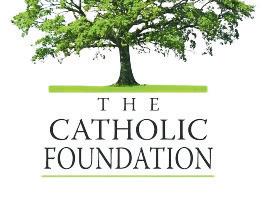
DINNER AT THE MERMAID CAFE 6 PM



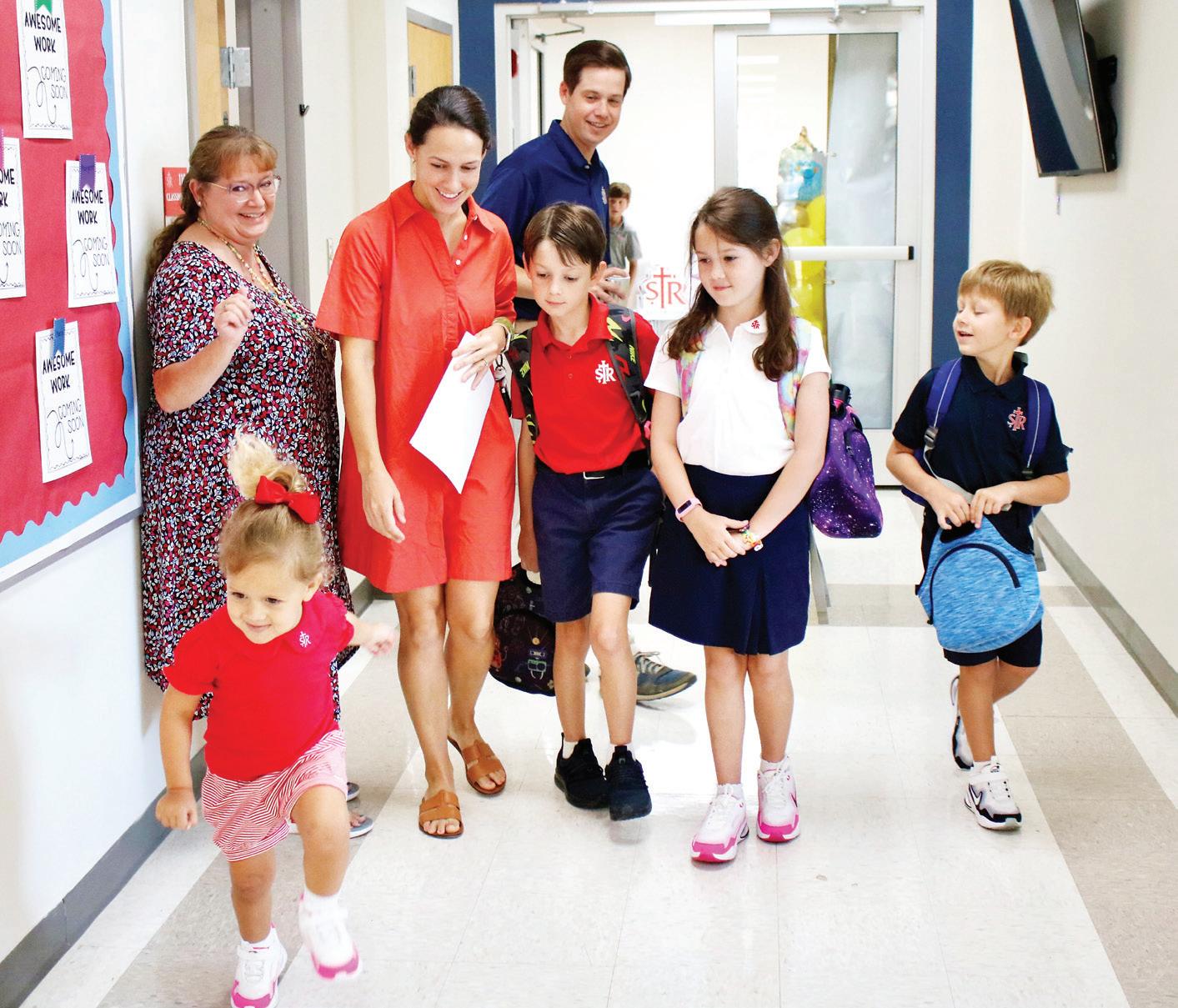
– First-day energy filled the halls of St. Richard School as the Stanton family explored the brand-new campus, walking their children to homerooms. Back: Jack Stanton; Middle: Pre-K assistant Sharon Ship-
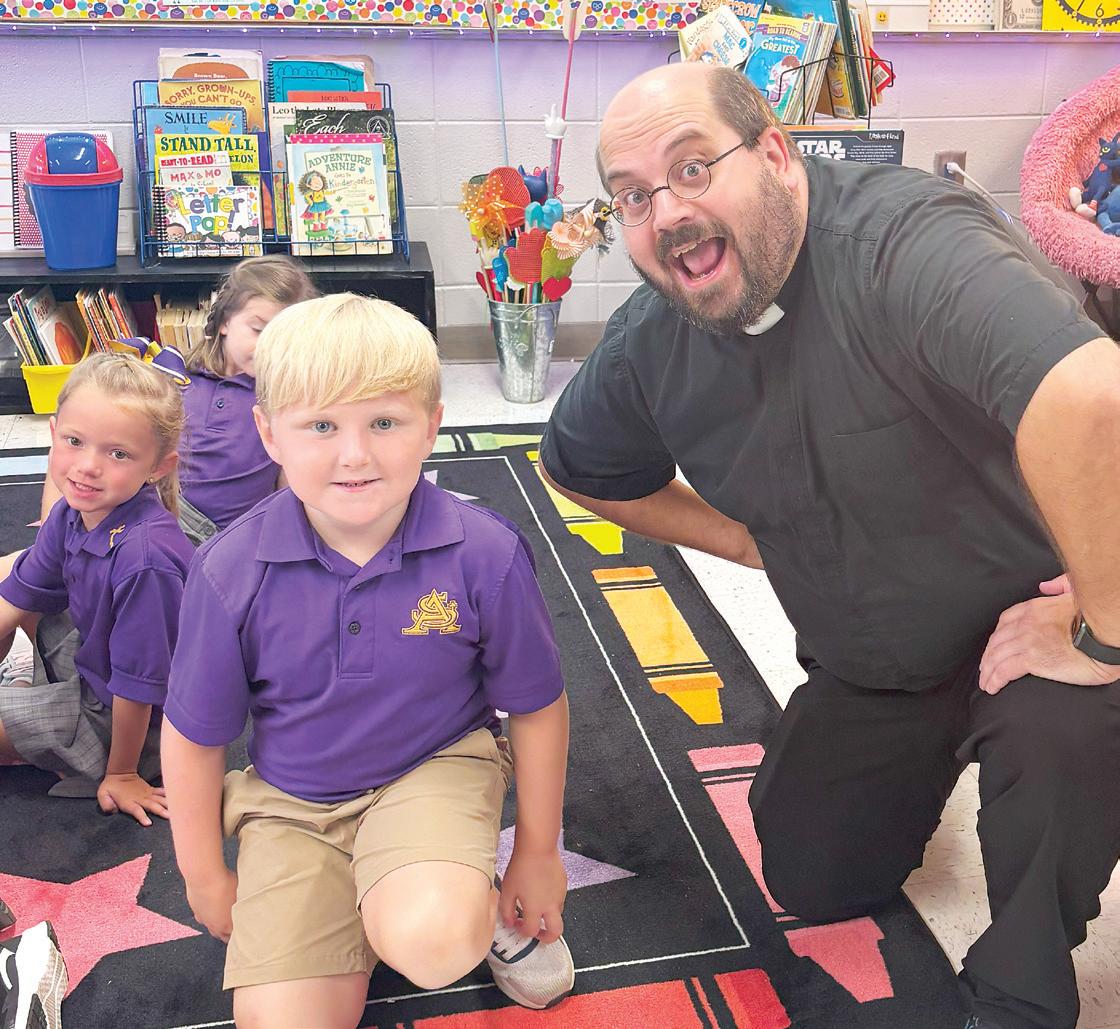
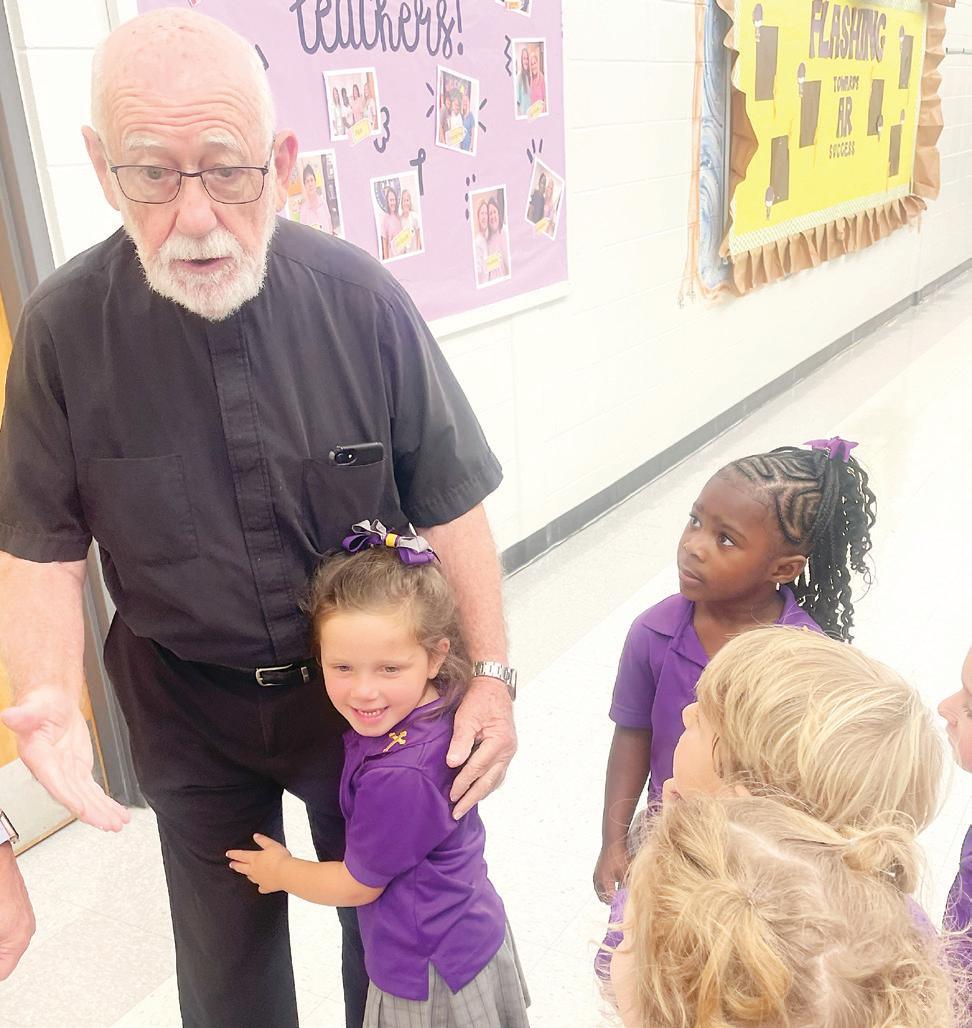

VICKSBURG – Father Rusty Vincent, pictured with Luke Richards, shares a joyful moment with kindergarteners on their first day of school. (Photo by Jordan Amborn)
Father PJ Curley shares a warm hug with Nola Brasfield and chats with other Pre-K4 students on the first day of school. (Photo by Laura Kidder)

For more than two decades, Michelle Harkins has been a steady and faithful presence at St. James Parish in Tupelo, Mississippi. From fulltime volunteer to trusted parish leader, her ministry has touched the lives of countless families – and it all began with a mother’s simple “yes.”
Her ministry started with a desire to support her children’s faith journey.
“I felt it was crucial, as a parent, to be involved and active,” she said.
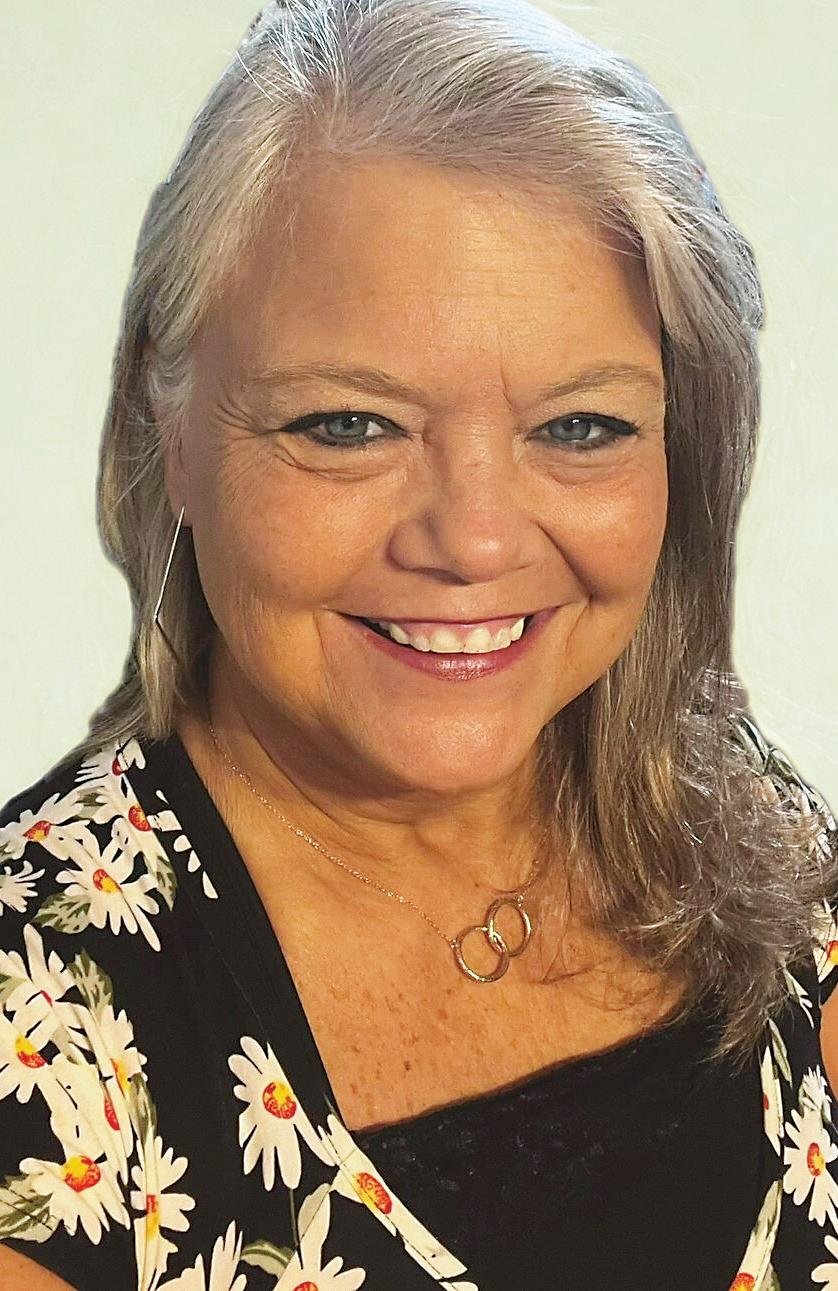
That involvement soon grew into teaching CCD classes, working with the Catholic Youth Program and eventually leading the parish’s Protection of Children ministry.
Over the years, Harkins’ own faith has deepened.
“Working with the youth helps me learn more so I can give a simple answer to what they may find a di cult question,” she said.
She speaks with great pride about the bonds that are built through ministry – connections that last well beyond confirmation or graduation.
“The moments I treasure most are when I’m told, ‘Thank you for being there with me through it all. Thank you for your time and understanding,’” Harkins said.
Perhaps the most rewarding part of her ministry has been seeing the full circle of faith lived out in the lives of the young people she once taught.
“There are so many stories,” she said. “But the ones that stand
out are those I walked with through faith formation and now they walk with me as adult teachers and chaperones. Lauren Pound, Patrick Dye, Denise Burnley … they were ‘my kids’ and today they are young adults who are constant and present for the youth in our parish. It’s amazing and beautiful to see the full circle come to completion with the Catholic faith as their strong foundation.”

Harkins’ ministry is one of many supported by the Catholic Service Appeal (CSA), which funds programs and services throughout the Diocese of Jackson. She believes in it wholeheartedly and encourages others to give.
“The CSA provides so much more than people realize,” she said. “Please give and take the time to find out all the various and beautiful opportunities it supports across the diocese. It continues to provide for our retired priests like Father Henry Shelton – who is retired, yet still faithfully serves St. James.”
“To those who give to CSA and those considering a gift,” she added, “know in your heart that you are serving others in our diocese in so many ways. If you want to understand all that the CSA does, take the time to do your research. Contact the diocese. Ask questions. You’ll find that you are giving to a truly great cause.”
As Harkins continues her ministry, her story stands as a testament to the lasting impact one person can have on a faith community – and the ripple e ect of generosity shared through initiatives like the Catholic Service Appeal.
The annual Catholic Service Appeal unites Catholics across the Diocese of Jackson to support 14 vital ministries that serve local communities. From faith formation and youth ministry to seminarian education and clergy healthcare, these initiatives help carry the Gospel’s message to those in need throughout the diocese. Give today to help these ministries thrive.


